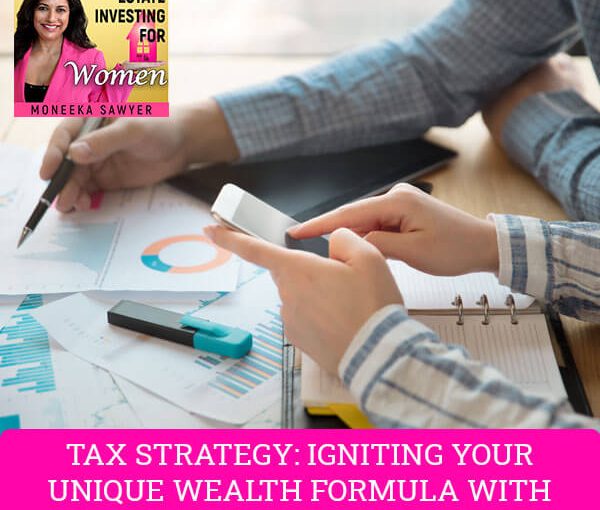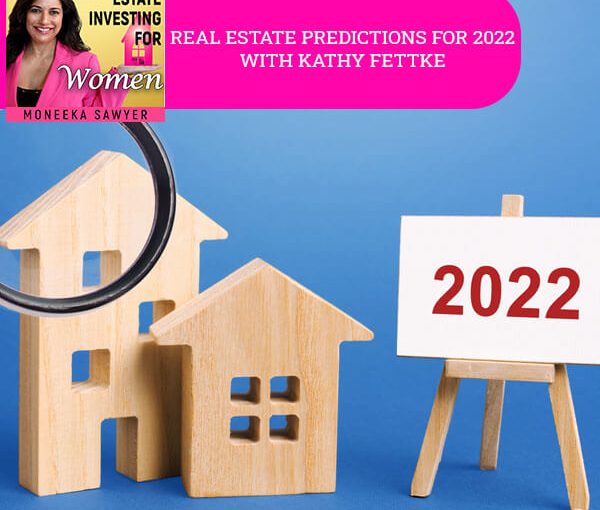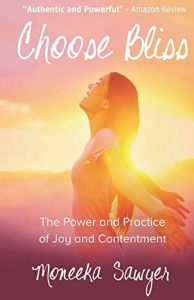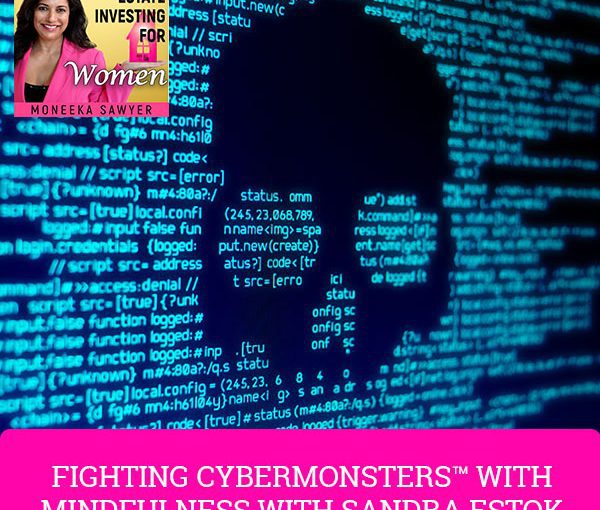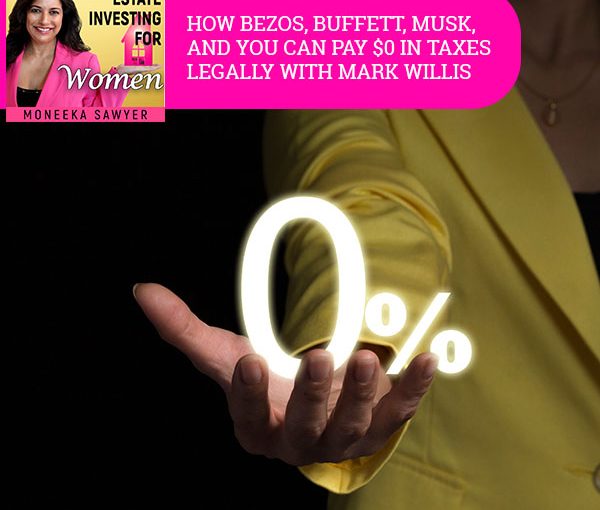Tax Strategy: Igniting Your Unique Wealth Formula With Lorraine And Jim Conaway
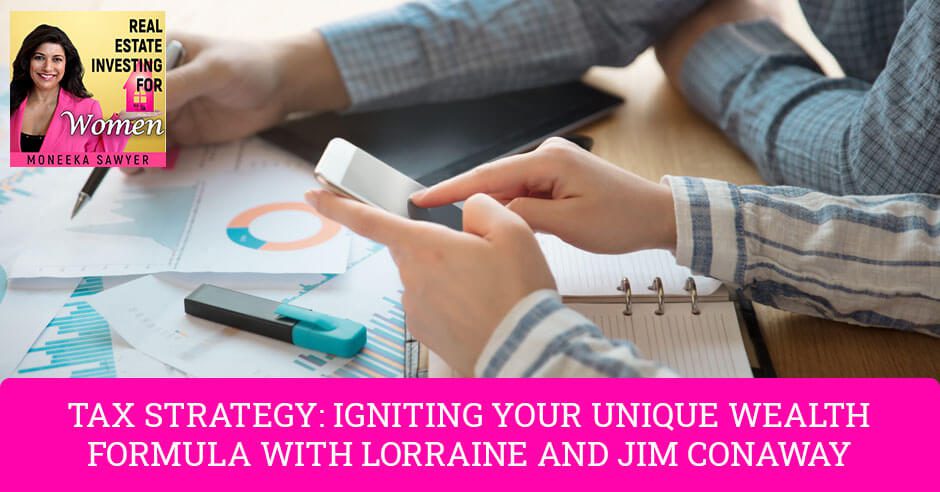
Your CPAs are your defense players; they’re defending the goal. Your tax strategists are the ones putting the points on the board. They make sure that you’re using the right and most efficient strategies. Join Moneeka Sawyer as she talks to Lorraine and Jim Conaway about tax strategies. They believe that success is truly about education, support, and the art of supercharging your unique style of wealth accumulation. Find out the difference between a CPA and a tax strategist. Discover the process and learn how they evaluate your taxes today!
—
Watch the episode here
Listen to the podcast here
Tax Strategy: Igniting Your Unique Wealth Formula With Lorraine And Jim Conaway
Real Estate Investing For Women
Using their extensive experience, knowledge and success in the world of tax strategies, real estate investing and other wealth vehicles, Jim and Lorraine used their straightforward, big-hearted style to guide thousands to ignite their unique wealth formula. With decades of success, designing and implementing customized wealth solutions, they appreciate that success is truly about education, support and the art of supercharging your unique style of wealth accumulation.
—
Jim and Lorraine, welcome to the show. It’s nice to see you.
It’s great to be here. Thank you.
We’re excited.
Lorraine has been on this show before. I’ve met Jim several times. We’re all in a mastermind together. I was so excited to share the two of them. Lorraine is so brilliant and shared such good stuff about the CARES Act. They’re such an incredible power couple. The 1 plus 1 does not equal 2 and equals 11. That is true. I’m so happy to have both of you with us. Let’s start with a little bit about the story of how you put this company together. You cover a lot of good stuff like all sorts of strategies around real estate. I remember when I first talked to Lorraine, my first thought was, “Where have you been all my life?” You talk about all these different strategies. The one that I am engaging you for is taxes. Let’s talk about how that piece started for you.
You would think that being a tax expert, a CPA, would make you a tax strategist. That is not the case.
It organically came together. We met in the business.
My first thought was, “Where has she been all my life?”
In the business, years ago, we were working at an insurance company. We started our company in 1996. We worked for ten years side by side with the CPA. Along the way, we started investing in real estate. My father is a contractor. He always had real estate. We had the real estate going on the side. We had our business working. We’re learning about taxes and finding that there was an enormous amount of money in the tax return. I was frustrated like, “Why are people talking about this?” Even in our situation, when we got our taxes done, our CPA said, “You could have saved $18,000 if you had this type of structure.” We’re like, “You tell me after the fact.”

Tax Strategy: Think of your CPA as your defense player; they’re preventing points by defending the goal. They’re not putting points on the board. The tax strategists are.
We have to spread the word, educate people and let them know that there are better ways of doing things. That you could keep much more money in your pocket and then get the education on real estate, not just investing but understanding how to maximize your real estate portfolio feeding in the tax strategy with the real estate and business. We’re business owners and entrepreneurs. Over the last few decades, it all came together like a recipe going, “This tastes good.”
You look at taxes differently. You are business owners. You two are not CPAs. You have a CPA team. You marry the business mind with the CPA mind, which I love. Talk to us a little bit more about what makes you or your team different from other accountants.
I’m going to jump in here and dovetail into something that Lorraine talked about. That was how we came to be about how we are. We learned by working side by side with CPA and learned an enormous amount working with that man and his practice. What we found was that by doing the tax strategy, we were having a greater impact than we were working with people’s assets. We learned to turn our world upside down and work from the tax down. What makes us different? Is there isn’t a class out there? There’s not a designation out there that says, “You’re a tax strategist.” This is where people disconnect. You would think that being a tax expert, a CPA would make them naturally a tax strategist. That is decidedly not the case.
My analogy is a sports analogy. Think of your CPA as your defense player. They’re preventing points by defending the goal. If you think about their language, that’s how they operate. “Can I defend this with the IRS? Does that make sense? Can we justify it?” Those are the words that you hear from them. They’re defense players. They’re not putting points on the board though. That’s our job. If you’re using the soccer analogy, think of your CPA as the goalie. Think of us as the kicker, the point, the guy that gets the ball and puts it into the other net to score points.
We came about how we are by organic growth, most of it from our painful experience. When you’re trying new recipes in the kitchen, that’s always a mess in the kitchen. What our clients get to enjoy is the fact that the recipes are all nicely laminated in cards. We’ve gone through. We know how long to leave things in the oven. The biggest difference is we are the people that are putting the strategies in place before the taxes.
Other people have brought it to our attention that said to us, “Do you know why you’re unique and why you’re different and why you have success?” I’m like, “Tell me why.” They say, “It’s because we focus on the implementation.” When you meet with somebody and they said, “You could get an entity, maybe do a cost sag on your real estate, deduct a certain way or your accounting, £6,000 on a vehicle and all of these things.” What happens is there’s a lot of information out there like on the internet. It’s like, “Who do I trust? Where do I go? What is the right fee?”
It’s like, “I get an entity. What’s the state that I live in? If I get an LLC, is it a partnership? Is it a disqualified partnership? Do I file as a SEVIS or C corp?” There are all these other questions that people are left with going, “I got information but who has time to sit with me, hold my hand and say, ‘This is too complicated. It’s too much. My CPA tells me to get an escort but my attorney tells me to get an LLC. Which one is right?’” What we like to do is get both parties on a joint call together and discuss it. Let’s get all on the same page. We’re advocates about teams, getting the right team on your side, working together collaboratively and not having to redo your strategy and focus on implementation. Almost all of our time is focused on implementing the strategies.
What I love is that if you’re working with a tax strategist, you have all of the team members available to you. They all understand similar strategies and are having conversations. I’m not talking to my lawyer bringing information to my CPA. I’m not playing the middleman. With me not knowing what I’m talking about in the first place, which is why I need them. We’ve got a middleman that’s educated, doing it themselves and understands the process.
Don’t treat people based on their checking accounts. Treat people based on who they are and provide as much value as possible.
In the past years, I’ve been using a tax attorney. This speaks to what Jim was talking about. The reason I used a tax attorney is that he’s on my side, not on the IRS’ side. He’s not playing defense. He’s playing business coordinator for me. In part of what he does for me if I were to ever get audited, as he represents me in court and that thing, they handled that whole picture. Jim, what you were saying about how we’re not playing defense rationally doing an implementation. You’re making the goals. How does that work? You are a CPA firm. Their responsibility is to the IRS. Could you speak to that a little bit more?
In my next appointment, I’m going to be sitting down with a CPA who only has several years of experience in advanced planning. I’m going to be sitting with him to review a tax strategy for a client. What I do is cook up all the good ideas that would apply to this client. We sit with our CPAs and edit them. “This would work but less of it. This would work, let’s do more of it. This won’t work at all. This works brilliantly.” We go through and do the checklist. When we do that, we have a tested strategy. We also put it in writing. The client has something to hold on to. I want to do 1, 2, 3, 4, 5, 6, 7, 8 different strategies.
I’ve got the rules and description. I understand it. If I want to read the document, most of our clients browse it. They don’t read it. They have a deliverable that they understand what the tax team is supposed to do. Here’s a critical element. The tax team also gets a copy of it so they understand what the taxpayer needs. If you were our client and we’re looking forward to working with you, you would get a deliverable that tells you all the strategies.
The tax team gets the same deliverable so that when they’re looking over the tax organizers, there are 50 pages of questions that nobody knows how to answer. You do your best and send it down. Our tax people look at this stuff. They see the strategy and don’t see the information they need. They know there’s a disconnect. Reach out to the client and ask them for the information. “How big is your house?” “It’s this big.” “How big is your studio with the lovely rice paper screen in the background?”

Tax Strategy: Tax strategists got the rules and descriptions. Their clients have a deliverable, so they understand what the tax team is supposed to do.
That all goes in there. You can see immediately that there’s an enormous amount of connection. Imagine for a minute that we’re sitting with you as our fresh client and we suggest, “Your tax strategy calls for a C corporation. Do we have a network partner that knows how to set up C corporations and that’s their focus and they’re good at it?” They’re already exercised and working with us as part of the team. That’s the thing that helps with the implementation. Everyone in the network that’s already been through the process knows. You don’t have to explain it. It’s one and done. Once you go, “I approve of this strategy,” then it’s off to the races. Everybody knows how to do what they got to do.
In the case of an audit, do you support your clients? How does that look?
What it looks like is we take a 40-year CPA and put that 40-year CPA between us and the bad guys. That 40-year CPA will handle most audit questions. Remember, every strategy is A) Legal, B) Approved, C) All the documentation is in the strategy. It’s like, “Here’s the homework. Where’s the mileage log? Where’s this log? Where’s that log?” We collect the data and put it together. We go and handle the audit. You should also know, this is one of my favorite questions is it a red flag?
I hear this all the time. When you get, “That’s a red flag,” don’t do and write that off. That makes your return auditable. Many right eyes I haven’t taken because of that.
Not true. It’s a myth. The thing that is more likely to cause an audit than anything else is the size of the numbers on your tax return. The larger the numbers, the more likely you’re going to be audited. Think about it. Logic. If you are a tax auditor-manager person, would you audit somebody who has had a $50,000 tax return? Would you audit the guy with a $500,000 tax return? It’s $500,000 all the time. What this tells us is that we have, roughly speaking, a 3% chance of an audit. If you went Vegas and you knew you could pull that handle on the one-armed bandit and you had a 97% chance of winning, how often would you be pulling that enamel?” We don’t want to push the IRS but we want to do everything that we’re legally entitled to. That’s what the strategy is all about.
It’s about following the rules. Another thing that I see is that when there are errors like we had somebody who doubled expense something or there’s not a matching item when it’s not matching, the IRS is going, “Why is this not matching? You got 1099 for X amount of dollars but you reported a different number.” Those types of things are errors. One thing I would say though, from my experience is that people who have very clean accounting and books either have a bookkeeper or they’re doing it themselves but they’re using like a QuickBooks process.
You get clean PNLs, no commingling of money in your corporate checking or your real estate, keeping the real estate separate from your checking account, you pay your groceries and your bills. You got to keep your real estate separate. When you have clean accounting then it’s so much easier process than going through an audit. When it’s commingled and muddy like that, it’s a nightmare.
Do you help people to understand what all of those things are? What is it exactly that we need to avoid this idea of commingling and stuff like that? It’s bigger than the account that you pay for your groceries and business account. I’ve got five different businesses. There are intricacies to that too. Do you help guide people on how to make that last money?
Typically, we’ll ask people, “Do you have a bookkeeper? Do you have a separate checking account?” Starting with the basics of having a separate checking account. When people ask us about those questions, we will go through them and go deep. When they don’t ask us, it’s because we’re covering so much material and education. Everybody’s so different. Some people have different specific needs and goals that they want to know answers to. They might be selling a property and are like, “I don’t want to do 1031,” or whatever it is. It’s all over the map.
We will help the people as much as we’re able to help the people. What we would do normally with bookkeeping is we’ll bring in somebody who is a CFO-level bookkeeper, have them audit the books and let us know exactly what they see. I spoke with a client. In 2021, we brought in our bookkeeper who was trying to be nice to the client, politely pointed out that there were some small changes that they needed to make in their bookkeeping. It turned out that was $540,000 worth of loss carryforwards that they had never reported. The bookkeeper found this error. They save taxes on over $500,000. It can be very valuable to have somebody go through and make sure the books are nice and neat, somebody with an accounting background, not just a bookkeeper.
Tell us what kind of person should engage you. Does it matter where a person lives?
It doesn’t matter where a person lives. They can live in any of the 50 states. We’re nationwide.
People who are alive. That’s the first criteria.
Typically, the people who have more complex and multiple returns have greater value. The more opportunity on saving taxes is the greater value. If you could save $500,000 in taxes, that’s great but there’s no minimum. We work with everybody.
Lorraine and I went through a season where we weren’t financially successful. This is way back when we were quite young. We remember what it was like and how it was when we got treated well and we didn’t get treated well. We committed that we weren’t going to treat people based on their checking accounts. We were going to treat people based on who they were and provide as much value as possible.
Let’s talk about costs. What is this going to cost? Are you going to give blissful investors a special deal?
To do an evaluation takes us quite a bit of work. The process is we reach out and we’re going to have the link. You go to the link. It’ll be a pink link.
They made a landing page especially for my community. As we were talking about it in the green room, I was like, “It has to be pink.” That’s what that reference is.
They will have the opportunity to raise their hand and say, “I would like to have my taxes evaluated to see if there’s any money to be saved.” The evaluation does take time and effort. It’s normally $497. How much are we charging the blissful investors?
We’ve discounted it to $97.
Save taxes so you can turn around and invest that money.
That’s the deal you ladies are getting. When you go to the website, which is BlissfulInvestor.com/taxstrategy, that’s where you would get the Last-Minute Tax Deductions, which is the free report.
It’s 2021 and they will be useful for 2022.
You also get the added benefit of 80% off of an actual consultation with them. Is there anything else you wanted to add before we go into the three rapid-fire questions?
I’m looking forward to people saving taxes so they can turn around and invest the money.
Find more real estate.
That’s the big thing. That money is saved for our businesses. Grow your real estate fempire. That’s what I’m calling it. Become a real estate mogul. It’s good to understand that this is a business strategy. Thank you for mentioning that. Here are our three rapid-fire questions. What’s a super tip on getting started in real estate investing?
The first thing is you have to understand that getting started in real estate means moving. I don’t care what you do. There’s no shortcut. It’s getting moving. If you’re in action, you can do something like wholesaling or sandwich places. You can save money and buy income properties. You can use your tax savings to help you save for your real estate. Get in motion. That’s the bottom line.
What is one strategy for being successful in real estate investing?
Saying yes to your wife.
That’s good advice. We need the guys to read this.
It’s managing the manager. Before you manage the manager, do some serious due diligence and find the right manager because you can have the most amazing property in the great area and grants and have terrible management. If the management is not responsive to the tenant, the tenant is going to move out. You’re going to have a vacancy and then the property is going to go downhill. Management is crucial and critical. Managing the manager is important and making sure you have the right manager.
Make sure that they’re going to be responsive to you, the investor.
You guys don’t do turnkey properties but you help people to find them to be working with teams that find you properties that have leverage. In real estate, we love to talk about leverage. Part of that leverage is our relationships. If you’re going with a turnkey operator or something like that, they have many properties so they can put pressure on the managers if things start to go sideways.
We do have vendors with properties with turnkey. We have already done the due diligence and have our properties with these vendors.
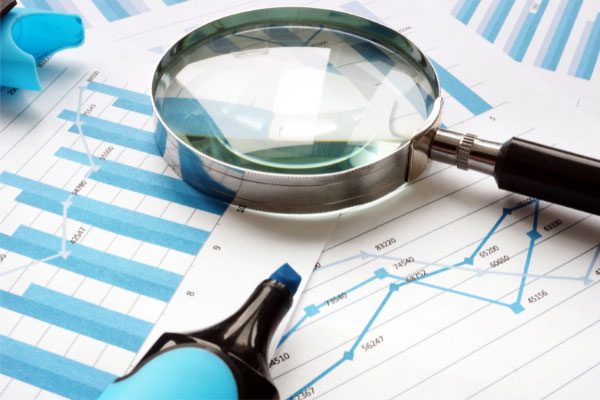
Tax Strategy: The thing that is more likely to cause an audit than anything else is the size of the numbers on your tax return. The larger the numbers, the more likely you’re going to be audited.
What was the cash-on-cash return for that one investor?
It was about a 20% cash-on-cash return. We also have amazing non-recourse lenders, which we can explain at another time.
We have to talk much more. We’ve got lending, turnkey, notes, self-directed IRAs and so many amazing things. This is why I was like, “Lorraine, where have you been all my life?” They’ve got all the different pieces and you’ve got access to them in one place.
The network has developed over the decades. Somebody said to me, “Do you know how valuable your address book is?” We don’t have address books but what I’m talking about is your network, your Rolodex. I was like, “I didn’t pay attention because I’ve been doing my job and working in expanding and getting all the pieces and all the people to bring it all together to create great success.”
I like both of you to answer this. What is one practice that you do daily that contributes to your success?
For me, it’s saying, “Yes, dear,” multiple times a day and staying very close to our real estate vendors and various network partners.
We don’t want to butt heads. Although we both meet with people, we have different roles in our business and working together. One thing for me is I focus on the critical things that I have to get done for the day before I even open an email. I have to get control of each day. Stay focused and accomplish what I said I was going to accomplish.
Thank you for that. We do have EXTRA. We’re going to be talking about the Augusta rule, which is a tax write-off that nobody seems to know about. It’s so interesting because when I did my tax evaluation, Lorraine was like, “You’ve heard about the Augusta rule. Why are you not using it?” I was like, “Can I use it? I’m just a little guy. What is this?” It could have saved me $20,000 in taxes. We ran the numbers. I’m super excited about it. It’s simple and available to many different people that wouldn’t expect it. That’s one of those little strategies that is often missed. It shouldn’t be. We’re going to talk in detail about that in EXTRA. Did you want to add anything to that?
No. I’m looking forward to speaking about that in your EXTRA.
Ladies, if you are subscribed to EXTRA, stay tuned. You’ll get to know about the Augusta rule. If you would like to subscribe to EXTRA but you have not yet, go to RealEstateInvestingForWomenEXTRA.com. The first seven days are free. Get in there. Seriously, this is the time to do it. If you don’t love it after seven days and you’ve gone through the content, you get to make that choice. For those of you that are leaving Jim, Lorraine and me, thank you so much for joining us for this portion of the show. I hope you enjoyed it and got great value. I look forward to seeing you next time. Until then. Remember, goals without action are just dreams. Get out there, take action and create the life your heart deeply desires. I’ll see you soon. Bye.
Important Links
- Jim Conaway and Lorraine Conaway
- Lorraine Conaway – Previous Episode
- BlissfulInvestor.com/taxstrategy
- RealEstateInvestingForWomenEXTRA.com
______________________________________
To listen to the EXTRA portion of this show go to RealEstateInvestingForWomenExtra.com
To see this program in video:
Search on Roku for Real Estate Investing 4 Women or go to this link: https://blissfulinvestor.com/biroku
On YouTube go to Real Estate Investing for Women
Moneeka Sawyer is often described as one of the most blissful people you will ever meet. She has been investing in Real Estate for over 20 years, so has been through all the different cycles of the market. Still, she has turned $10,000 into over $5,000,000, working only 5-10 hours per MONTH with very little stress.
While building her multi-million dollar business, she has traveled to over 55 countries, dances every single day, supports causes that are important to her, and spends lots of time with her husband of over 20 years.
She is the international best-selling author of the multiple award-winning books “Choose Bliss: The Power and Practice of Joy and Contentment” and “Real Estate Investing for Women: Expert Conversations to Increase Wealth and Happiness the Blissful Way.”
Moneeka has been featured on stages including Carnegie Hall and Nasdaq, radio, podcasts such as Achieve Your Goals with Hal Elrod, and TV stations including ABC, CBS, FOX, and the CW, impacting over 150 million people.
Real Estate Predictions For 2022 With Kathy Fettke – Real Estate Women
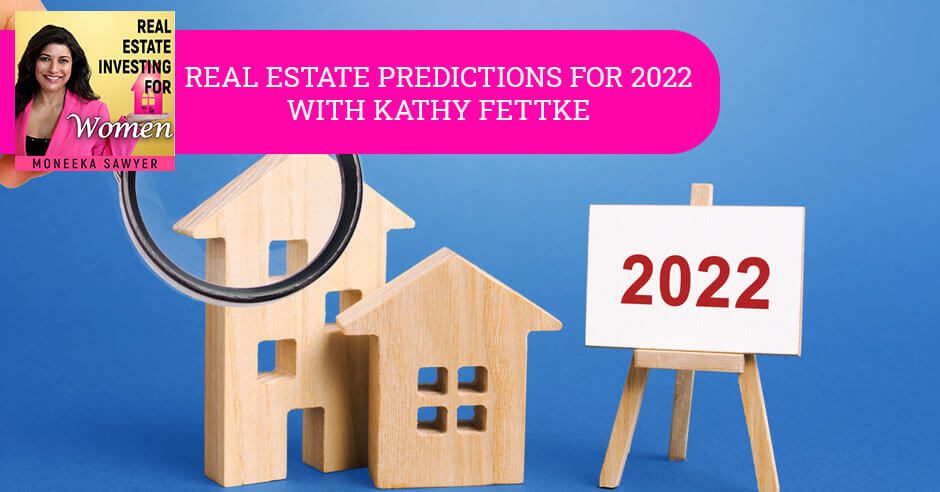
With the pandemic affecting everyone around the world for the past few years, it also impacted the economy. A lot of people are struggling to get by every day. Kathy Fettke believes that 2022 will be different due to inflation. With a passion for researching and sharing the most important real estate and economics facts, Kathy is a frequent guest expert on such media as CNN, CNBC, and Fox News. In this episode, she emphasizes that people need to be cautious in buying and selling homes. The demand for houses is rapidly increasing, so the supply is insufficient, allowing opportunities to house rents.
—
Watch the episode here
Listen to the podcast here
Real Estate Predictions For 2022 With Kathy Fettke – Real Estate Women
Real Estate Investing For Women
Kathy, welcome back to the show. It’s nice to see you.
Thank you. It’s so nice to be back.
Thank you so much for having me on your show.
I learned so much about you that I did not know.
When you hang out with people and you get to know them, you respect them, but you don’t talk necessarily. We don’t talk about ourselves naturally. That was lovely, but thank you. What I wanted to share with my audience is what your perspective is on what to expect in 2022. Does that sound like a fun topic?
Let’s do that. It’s on everybody’s mind.
What are you expecting?
In 2020, I said I was expecting a Black Swan Event. Can you believe that? I did not know exactly what I was predicting there. 2022, we have a few factors in place that people need to be aware of. One is that we have inflation. We are seeing lots of inflation. For investors, the people who own real estate, that can be a pretty big deal. You can build some wealth. It’s not necessarily wealth because it’s inflation, but at least you own assets that are inflating. If you don’t have assets, then what you have is the higher prices. People who own assets in inflation are going to increase your net worth, and those who don’t are going to have to figure out how to get in the game.
A coin with two sides. We got to look at all the sides. What happens in an inflationary environment is the Federal Reserve will then want to slow that down. The Federal Reserve is a central bank. It’s their job to curb inflation. That’s one of the key metrics that they look at. For a long time, the Federal Reserve was saying, “This inflation was transitory.”
Many of us were saying, “We will be checking in with that. It does not look like it’s going to be transitory when you printed so much money. That’s a whole lot of money circulating. That is going to create inflation.” A lot of us were questioning that, but here we are and the Fed is now saying, “It’s probably here for a bit longer,” which means they are going to raise rates to try to slow down the economy to try to curb inflation.
This is a big mouthful. It’s a lot that I’m saying, but bottom line, when the economy is chugging along and it’s going strong, that means people are getting hired and there are jobs, there’s a strong stock market, real estate prices are going up, and people are making money. They are spending money and all that is circulating, and the velocity of money is driving prices up. When you add to it, the fact that we have so many job openings, and that’s usually common in a robust economy, lots of job openings, which means that employers have to pay more to attract good labor, and there does not seem to be the labor out there, that causes inflation.
You add all the money supply that’s out there and this issue with materials and all these issues that we are having, trying to get the materials that we need, and because we can’t get them, the costs are going up. There are so many factors that are driving inflation that it’s forcing the Federal Reserve to raise rates, which historically has slowed things down in the past.
31 is the typical home-buying age. It’s a massive, massive amount of people over the next two, three years that are just coming into home-buying age.
Unfortunately, in the past, it slowed things down to a screeching halt many times. Often, in an environment like this, it would cause a recession. What we are paying attention to is will the Fed get it right? Will they do it nice and slow that the economy can adjust to it, or will it take the air out of that balloon? Moving forward, we need to be careful and cautious in 2022, about what we own, what we buy and what we sell.
It’s not going to be 2021, 2020 or 2019. It’s going to be more like 2018, where interest rates were going up. It was back in 2018 that the Fed did start tightening and started to slow down the economy a little bit. It was chugging along pretty good back then, too. That affected new home builders. They saw a slowdown, but the real estate market, in general, did not slow down, but new homes were having a bit of a more difficult time until 2019, when that reversed.
I don’t know if you remember, President Trump had a big fight with the Federal Reserve and they said, “You better stop raising rates. Stop it. Not on my watch. You are not going to have a recession while I’m president.” It’s basically what he’s saying. The Fed listened and turned it around. I’m not sure how that all happened, but it happened.
COVID came along and then the Federal Reserve did what’s called commodating, which is lowering interest rates and flooding the economy with capital. That worked and it got things going again, and now they got to put the brakes on. The bottom line is things could slow down a little bit, which is a good thing. It’s prices can’t go up at these double-digit rates forever. We do need to pay attention to the Fed and what the Fed does.
With that said, we still have some serious fundamentals in place, which is so many young people, these Millennials, who are reaching home-buying age, and there’s not enough supply for them, many of these young people who are forming families and want to have that backyard and never want to be stuck in an apartment again. In case, there is another COVID situation where you are stuck in your apartment and can’t use the pool or the facilities. People are like, “I want my own yard,” especially when they have got young kids and they are having kids. They are the largest cohort of Millennials is 29 years old.
Thirty-one is the typical home-buying age. It’s a massive amount of people over the next several years that are coming into the home-buying age. The product is not there for them. You are going to have a tightening and a raising of interest rates while there the demand is still there. I don’t see any housing crash, but the intent is to slow down the dramatic increase of prices, which may or may not work because the demand is still there.
We have all these studies. Historically, we know what the markets do. We know how to affect and change the markets. There are specific tools that the government has used for a long time with some success or not, but it’s an unprecedented situation this time. First of all, we had COVID so we had all this money that flooded the market, but also our expectations. Up until COVID, everybody was moving more into the cities, people wanted to be closer together and condos apartments, and then COVID, now people are going back out into the country, not the country, but you know what I mean.
All over. They are going to cities, too. There’s a massive household formation.
It’s because people are getting to choose. I don’t know if this is true all over the country, Kathy, help me to understand, but in the Silicon Valley where I am, we can now work anywhere. You can move to where you can get a larger house. Even if you are paying the same amount, you are getting a larger house that might be in a different city. Are you seeing that people have so much more mobility so they can make choices that are better for them and their families?
We are seeing that, but we are also seeing a massive demand for homes in Silicon Valley. I read an article about the mass exodus out of California. I know real estate agents in the San Francisco Bay Area who cannot keep up with demand, still have multiple offer situations. None of it makes sense. I would say that there are people who are making life decisions that they maybe could not before. That life decision might be, “I might sell this house while I can get multiple offers and go live in Arizona or Boise, Idaho, Texas,” or wherever they are going, and live a very different lifestyle.
You could sell your house in the San Francisco Bay Area and have the mortgage-free if you wanted to, or have a much bigger house for a much lower payment or have maybe better schools. A lot of people are making life choices that they maybe could not make before, but what that does is open up a property for someone who now gets to buy it, even though it seems so much more expensive than it was a few years ago, but maybe not with the interest rates.
My daughter bought a house that was probably $750,000. She paid $1,100,000. That payment is the same as rent in Southern California. She’s outside of LA and half an hour from me. She was able to take on such a huge purchase because the payment is not different than the rent. What was offered out there was hideous.
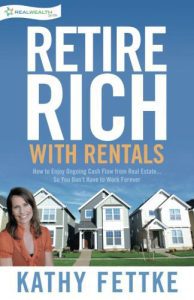
Retire Rich with Rentals: How to Enjoy Ongoing Cash Flow From Real Estate…So You Don’t Have to Work Forever
She could not find anything she wanted to rent, so she bought it. I’m so proud of her. She had listened when she graduated from college and got a job in Chico. I knew that the home prices were still in the $250,000 to $300,000 range. I was like, “Please, listen to your mama. Don’t buy a car and please go buy a house.” She’s like, “Mom, I’m 24. I’m not buying a house.” I said, “Please talk to a mortgage broker.”
She did. She found out she could own a house in Chico for the same price as renting, again, amazing in California. She did it. Three percent down. She had to put $11,000 down. She had it, she had saved it. She made $100,000 on that. When she sold that house, she was able to buy this $1 million house. It’s amazing to me that it’s the same as rent. All in, she’s at $5,500 a month, and that’s sadly what the rent is, but that’s how it is in the Bay Area too.
I had the weirdest situation. We had a bidding war for a rental that I was renting out where I listed it a little bit low, which is what I always do. I like to be in the middle of the market, not the high range, and provide a good product for a little less. It was the people motivated to stay. We had a bidding war that went over market. It did not go over market. It went right about the market.
Things are crazy to even as a landlord. You are right. There are all sorts of interesting things going on. I feel like it’s hard to understand and predict. That’s causing an awful lot of uncertainty with investors. There is this the right time to do it. What would you say to an investor around us? You told your daughter to buy, so that speaks very highly about getting to the real estate market.
I was worried for her, not that she was paying $1 million for a house that was $750,000. I was worried she was not going to find a place to live, and they have a big dog that’s part pit bull. He acts like he’s a poodle. He’s the sweetest little guy. It’s hard but no one’s going to rent to someone who has a big dog, a little dog, a baby, and another baby soon. The fact of the matter is, I look at my daughter, who’s 29 and she represents what’s happening. It’s anecdotal, I often look at her and she’s always shown me what’s going on when she was trying to get into a soccer team when it was very difficult because she’s the largest group of Millennials, the 29-year-olds, most competition.
She had a hard time getting into college. She did get into college, but she was competing against brilliance everywhere, that largest group of educated people competing for houses. Watch the 29-year-olds because they are facing what we faced or I faced as a Baby Boomer, competition. It’s a massive group of people who are the most educated ever of any group ever. They have more education at their fingertips, more access to information and data. They have the highest college degree rate. Our generation did, but they have more information than our government had when we were young. It’s incredible.
I look at her and honestly, my 29-year-old has no problem paying $5,000 a month for rent. Not even a problem at all. These are dual-income families. She works at home. She’s got a tech job. She’s focused on email marketing. It’s nothing that unique but it’s needed. As more businesses go online and more jobs are needed for that and these kids know how to do it, they grew up with it. She’s doing great. I look at her and say, “How many of her are out there?” There’s a lot. If you look at the fact that there are 5 to 6 million homes that change hands every year, we think that we were looking at real estate that sells.
This group of Millennials is 80 million. It’s a lot of people. You don’t need every single Millennial to be a huge success, but there are a whole lot of them that are, and they are able to afford nowadays’ prices and especially if they are the ones who say, “I’m going to get out of these big, expensive cities and go live wherever I want.”
My daughter could, but I made sure she lived near me because I needed to see those grandbabies. It’s a hard thing for me too. At RealWealth, I’m responsible for the things that I say influence thousands of people. We have 60,000 members and they do rely on me and my research to help them make decisions of what to do next.
We syndicate. We have funds that we buy houses and apartments. I got to get it right. I can’t get it wrong. It’s a lot of pressure. For those of us who have been through something like 2008 or 2001, these times when the economy contracted, it’s scary. It’s like, “Is that going to happen again? Are we going to be buying at the peak and stuck with properties? We can’t rent.” I come back in 2009 when there were foreclosures everywhere, and people were losing their shirts.
I wrote this in my book, Retire Rich with Rentals. My mother was renting. They sold their Bay Area house and my dad died. She did not want to be a homeowner and she was renting. She was renting in Chico, California, where my daughter was going to school. Her landlord was a pastor. He was on a pastor’s salary. I’m imagining in Chico, is not a lot of money. Let’s say it’s $50,000 to $60,000.
I don’t know what a pastor makes in Chico, but I don’t think it’s a lot, but she was renting from a local pastor. This pastor was retired. When he was 30, he decided to start buying a house a year. He bought ten houses in the Chico area with his little pastor’s salary. When 2009 hit, it hit Chico too, and those houses lost value, but you know what did not lose value? Rent, because all the people that lost their houses suddenly became renters. My mom was one of them.
We need to be really careful and cautious in 2022 about what we own, what we buy, what we sell.
She did not lose a house, but she was choosing a simpler life that was renting. Here’s this pastor as an example. I wrote a bit about him in the book to show that example that during the worst housing recession since The Great Depression, that was the worst and we lived through it. This guy was getting a raise. His rents were going up.
He did not even care that the value of his asset had gone down maybe by 50%. He did not care because the cashflow going in his pocket, his retirement money, was going up. That’s all that mattered. I’m looking at this guy going, “He owns ten houses, probably free and clear. He’s retired. He bought him when he was in his 30s and he’s making $2,500 on each. He’s okay.”
I want to highlight this because this is a thing that people worry about when they are looking at buying and investing in investment properties. I had a very similar experience in 2008. I bought a property at the top of the market. That was brilliant. A lot of our properties dropped in value, but you are right. The rents went up. When you buy real estate in the Silicon Valley, in Northern California, you don’t expect cashflow for at least five years.
Sometimes you are going to carry negative because we are in appreciating markets. People don’t have this anymore. It’s expensive, but that’s how I have always invested, so that’s what I do. I buy these properties and I have got negative cashflow when I buy them. Suddenly we have a disaster and all my property values go down, but suddenly all my rents are now cashflowing those properties.
It’s the same thing as what are you looking at and making decisions based on what your long-term goal is. For him and for me, it was a retirement plan. I had confidence that the markets would go back up and my properties would go back up to value, hopefully, surpass. At the very least, my rents were going up.
It’s interesting. That was another disaster time like this pandemic we went through was another disaster time. It’s hard to predict what’s going to happen there. From my perspective, I love what you do, Kathy, because you are getting people into the get rich slow, tried and true path to building wealth in America. It’s like, “This is the thing that you do if you have a long-term vision.” A lot of people are twenty years out like, “I can’t think next week what I’m doing.” How do you think 20 to 30 years out? If you have enough foresight to put a little bit aside and do that, real estate performs.
I don’t invest in high-priced markets for long-term rental like you do, because it took us down. I’m telling you my story that we were about $10,000 negative cashflow during the downturn. That’s not sustainable, especially when the values have gone down too, and you can’t sell it. It’s not for me. What I decided worked better for me is going into markets where the values are lower anyway, so the risk feels lower to me. If I’m going to buy a house in Florida, that’s beautiful and maybe brand new, it is $200,000 to $225,000. That’s a lot different than $500,000 or $1 million.
If it goes down a little bit, it’s not a lot. The rents are $1,500. It’s not impossible for someone to pay versus $5,000 a month. That’s harder. I felt that for me, I never wanted to go through a negative cashflow scenario again. We look for neutral or enough cashflow in markets where it’s still so ridiculously affordable to me.
That’s what we are seeing is in these markets like Florida, Texas, Arizona, Alabama and Ohio, that other people are saying, “That’s cheap.” I could make that my primary, and then I can go on these fancy vacations or go do whatever things. I’m in good schools and so forth, but my mortgage or rent is $1,200.
To me, it felt safer to have more diversification and different markets with cheaper properties, but nice and good quality. I don’t like junk. A lot of people go into these other markets and we did for a while and to certain markets, and I won’t say which ones. We buy old junky properties and they were difficult. They are expensive to maintain. I don’t do that anymore.
I like to buy high quality not older than the 1980s. I tried to get even newer than that, and brand new if I could. I don’t mind buying retail in an area that to me is undervalued, because the locals are like, “Why are you paying retail?” A local real estate investor in Tampa might not want to pay $200,000 for a brand new property. They are going to look for the older one.
For me, that is so cheap. Can you even imagine a $200,000 property? I feel like it does not exist. It does not even exist in Chico anymore. Years ago, maybe Redding. I don’t know, but it’s, to me, there are enough people in the world who would look at this $200,000 property and think that’s a good deal. There’s enough money flooding in from all these different places. That’s what we look for, areas where even if there was a recession to me, I would not be worried about owning a bunch of brand new or very new-ish renovated properties in the $200,000 to $300,000 range. I don’t see how that could go wrong.

Real Estate Predictions: For people who own assets, inflation is basically going to increase your net worth. And those who don’t are going to have to figure out how to get in the game.
Let’s say 2008 and 2009 when the markets fall, when you got these lower kinds of pricing, do you see big swings in those prices also as far as the home values, or is it more stable?
I can say this strategy that I did back in 2005, I had Robert Kiyosaki on the RealWealth Show back in 2005. That was one of the best things that ever happened to me. I was a mortgage broker at the time. I should have been able to see it, but I could not and millions of people could not see it. He saw it clear as could be that the loans that were being given out were going to go bad. People lied on those loans, and I knew that. I was in the industry. I saw it every day. He knew when those were going to reset and they were going to reset in 2007 or 2008. He knew exactly when things were going to be a problem.
He was saying, “Sell everything in the high price markets, where there was an abundance of these loans because the only way anyone could afford California at the time was lying on their loan.” He’s like, “Sell everything in California,” because he knew how many bad loans were out and going to reset. He said, “Buy in Texas because they were very strict on their lending laws.” They did not allow that because they had gone through the financial crisis of the ‘80s, the S&L crisis. They had already had their banking system go down. They were like, “We are not doing it 100%.” Back then you could have a no money down loan and get money back.
That was not happening in Texas. He saw the lending environment being stronger there and there are so many jobs going to Texas. It all made sense to me. There were jobs going to Texas, population growth, pretty strict lending laws for the most part, and affordability. I was like, “This makes sense.” We went. I found a real estate agent back then and she seemed to understand what to buy.
Rich and I bought fourteen brand new homes that were retail. We got them slightly under, but we were paying between $120,000 and $150,000 for brand new homes that rented for about 10%, so basically like $1,200 to $1,500 a month and it cashflowed. It was like, “Let’s do that.” I could do as many as I wanted. It was so easy to get loans back then. That made sense to me.
When the market crashed, those homes did not go down in value. They did not go up, but they did not go down, but the rents went up. Here we were in the middle of the greatest recession and I was experiencing the same thing my mom’s pastor had experienced was rising rents. Unfortunately, I had kept a couple of California properties that took us down. You got to be careful of the weak links.
A couple of bad decisions took the whole thing down, but the good decisions were what I did. I bought quality properties. Since then, those properties in Texas have tripled in value. Unfortunately, I sold them before that happened. Someone else benefited tremendously. I was like, “Maybe people are right. Nothing ever happens in Texas,” so we sold them. We were cashflowing. It was not a reason to sell them. It’s so dumb.
Even the very best of us make wrong decisions.
Live and learn. That’s why I’m here to share all the stories that will help you not make those mistakes.
It’s true. I wanted a little bit more of that deeper information because I have seen this. I talked to somebody else, who is investing in Alabama and he was saying that, “You don’t see the appreciation.” Like in Texas, you are seeing the appreciation too. That’s an interesting market, but in Alabama, they don’t see the appreciation. They do see the rents going up. They see a little bit of appreciation. It’s not stable. It’s happening. When the market goes down, it does not have these huge dips that you get, for instance, in Northern California, LA or something like that.
It’s because it’s still so affordable. Part of our game plan is to only buy things that the average person in that area could afford. That left a very large group of people that, if things did turn, they would still be able to afford it. I did not want to go too cheap and go too high-end. It was right there where the average person could afford. That’s pretty easy to figure out.
You can go online. CityData.com is a great place to get data. You can find out what the average income is of the area, and that will tell you what the average home price should be. It should not be more than 2 to 3 times the average salary. That’s certainly not the case in California. In California, if you buy right, you are going to do well. That’s the bottom line. You have to have the stomach for that because you are going to make the most money in California. There’s no question. The first property I bought in California, our first home went up $100,000 every year for ten years. You don’t get that in other places.
It feels safer to diversify in different markets with cheaper properties but in nice, good quality.
It depends on your strategy. I’m thinking about what is cashflow going to look like for me. We don’t do that in California. Cashflow thing does not happen here. You going to figure that whole thing out. The other thing I wanted to ask you, I have never asked anybody this online. I always recommend the easiest real estate to get into is your primary residence, because there’s a lower down payment.
You have to pay rent anyway, why not pay it to yourself? I always say, “Get your primary residence first then you can use the equity from that either to buy something else, or you can start to save for something else, but at least you are not making another landlord rich. You get the benefits of it and for very little down often.” Do you agree with that?
Yes. Kiyosaki says your home is not an asset. That’s one area where I differ from him. For our home, we have a guest house on it. When we Airbnb it, it pays for the entire thing. The money we get from that rental pays our entire mortgage and landscaping. Your primary these days can be an asset. I have got friends who are going to come to stay with us because they rented their house out and Airbnb and I’m like, “You use our guest room.” What is our term? We will use yours. People are using their primary now to make money. I’m close enough to LA that I will rent my kitchen out for cooking shows and stuff, and I’m like, “I love making money. I will do it anyway I can.”
A hundred percent, there is no excuse. I’m going to say this right into the camera. There’s no excuse for not owning real estate because you can buy something with 3% down and maybe even less. If You are a veteran or in the military, you better own real estate. That’s all I can say because the opportunity for you to get low-interest rates on veteran’s loans, you can do it. The FHA loans or conventional loans, you can get a fourplex for 3% down. You can live in one unit and rent out the other three units and probably live there for free and or even cashflow get paid to live there.
You might have to sacrifice a little bit. You might have to live somewhere where you don’t want to live forever. That’s okay because you don’t have to live there forever. That’s the important thing that a lot of people don’t understand, and my daughter, even with this house is a $1 million fixer that she bought. I’m like, “This is not your forever house. This is your inn. That sounds crazy. That was the cheapest house in the neighborhood, but in a nice neighborhood with the best schools. It does not have to be your forever house, even if you are buying it as a primary residence with a primary loan. It’s a loan as your primary home. There’s nothing in that documentation that says you have to live there forever. You can get that 3% down primary residence loan and rent it out in two years.”
We think about the way Americans are. We move every 4 to 5 years anyways. No matter how much you love that first home, you will find something you like better, even if you think it is your dream home. That first home that you get into does not need to be perfect. The mistake that we make is that it has to be the perfect home, or you don’t want to move into it.
Would you do that with a rental? “It has to be the perfect rental or I’m not going to move in.” You would not do that, and you are paying somebody else to own that home. Instead, do that for yourself because it does not need to be perfect. It needs to be good enough that you will enjoy it for the period of time that you choose to live there. You are not marrying this house.
In my opinion, the deciding factor would be, “If I found something better, could I rent this out, and would it cover my payment?” In the case of my daughter, her payment is $5,500 a month. There’s nothing in the area for less than that. That’s what I said, “It may be not perfect for you, but it’s good enough. If you something better, you can rent this out.”
What I found is when you are busy and you are raising children, ten years can go by real fast. When they first came down to be near me. When they found out they were pregnant and needed mom around to help, I said, “You are going to be shocked. You get a two-year rental because you are not going to believe how fast two years go.” Sure enough, the lease is up and there was nothing for them to rent, if you want the security of knowing that no one can kick you out and that your mortgage is going to stay the same.
That’s your key. If the mortgage is going to stay the same. No landlord is going to raise your rent. Nobody’s going to sell the house from underneath you. It’s yours.
You can fix it up and everything you do to it is improving it, increasing value, and I guarantee, I can almost say, even though legally I should not, but I guarantee if you stay there for ten years, it’s going to be worth more. Even if it’s not, you have spent ten years paying down that mortgage and you have paid towards it.
If you live in San Jose, California, you might not be able to do it. I understand that. Maybe you are going to have to move to Milpitas. You are not going to maybe, “Milpitas might be too expensive. Maybe you are going to have to move to Stockton.” “I don’t know.” Whatever it is, if you can’t do it in the Bay Area, I understand that it’s pretty hard to get anything there, but it might be for a period of time, you live somewhere else.
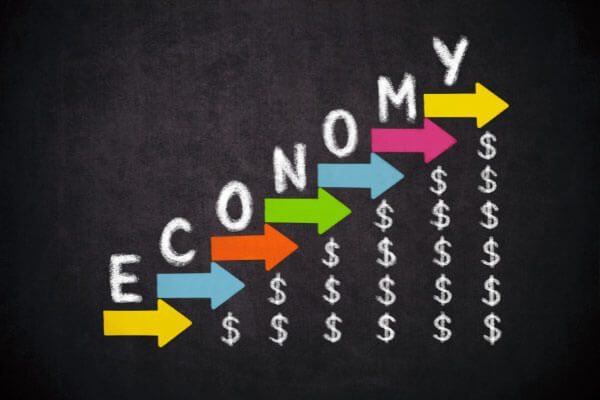
Real Estate Predictions: When the economy is going strong, people are getting hired. There are jobs, a strong stock market, increasing real estate prices, and people making money.
There is this whole thing about your primary residence that is not your asset. You made some good points that you did Airbnb, and you rent out your kitchen and all of that stuff. My husband always says, “Does that mean that my stock portfolio is not an asset? Does that mean that whatever this and that my savings account, making 0.02%?” That’s not an asset.
The thing is that all of those things are part of your net worth. It’s also depending on how are you accounting as an asset, just because it’s not making you money that you are writing off against or whatever does not mean that it’s not an asset. The big thing to remember is that instead of making somebody else rich, you are putting money towards your own future. There are a lot of cool things that you can do with that.
It’s your own. It will never be sold from underneath you, all of these things that we talked about. You can rent out a room if you need to. When I first bought my very first place, we could not afford it. We rented out a room so that we could. When we lived in Mountain View, I rented out one room. Airbnb and it paid for the mortgage and so much of our lifestyle because we were right next to Google. We were making a huge amount of money on one room. There are interesting things that you can do.
I have rented out my driveway. I’m near LA and we have a big driveway. That’s rare. They wanted to do a car commercial. I have had people want to rent our backyard for weddings, just for the ceremony, because I did not want drunk people in my yard.
Each market that you are in is going to have different things. Keep your ears and eyes open. She lives in LA and she has access to all these different things. I had lived in Silicon Valley. I have different things that people are asking for, but every place has its own little things. Each community has its things and you can take advantage of those things.
What I would want to leave with your audience is that we are in an inflationary environment. The Fed is going to try to slow that down and it will probably slow it down a little, but they are in a difficult situation where they can’t raise rates high because of the enormous amount of debt that would be impossible for the government to pay. It’s a difficult situation for the Fed to try to slow down this inflation.
What we know for sure in the housing world, in the US housing market, is that there’s not enough new supply for the amount of demand that these Millennials are creating. That’s a huge group of people that are now home-buying age. Add to it that you have got more people buying investment properties, having second homes, Airbnbs, people living longer, staying in their homes, the supply continues to diminish.
At the same time that we have got massive demand and low-interest rates, we don’t have the supply. This is going to be a problem moving forward for a while, and this is why across the US, you are seeing the same problem. Huge demand and not enough supply. If you are looking to protect yourself against this massive inflation, it’s important that you acquire real estate.
I can’t say that enough. You are going to get left behind. It’s only going to get more expensive. If you are waiting for that foreclosure crisis, you might be waiting for a while because there’s simply not enough supply. If somebody can’t make their mortgage, they are going to put it on the market. They are not going to sit around and wait for the bank to take it from them.
They are going to put it on the market and get their equity and sell it, and it will sell quickly. These foreclosures are not looking like that’s going to be an issue any time soon. If you can save your money and find parts of the US where there’s high demand, Austin, Dallas, Tampa and Jacksonville. The Southeast is the fastest-growing part of the US and homes are still cheap there, yet it’s attractive and there’s job growth.
You can still buy properties for $200,000 or less. If you want a fancy property in a class neighborhood, you pay $300,000. What are the chances that you are going to lose money on that? It’s slim. You are going to be all in around $1,200. There’s an incredible opportunity and a $200,000 house, that’s a $40,000 down payment. You do need to save your money, but if you don’t want to wait, then buy your primary because that’s only 3% down.
You have been on the show a few times and you have talked about the RealWealth Network. I want to make sure that I highlight that to my ladies. Kathy knows what she’s talking about because she helps you to buy properties all over the country or her team does. We have met Leah before on the show. She’s our own exclusive coach with RealWealth Network.
Live and learn. Listen to other people’s stories so you can learn from their mistakes.
If you want to find out more about what Kathy is talking about in these different markets, you can go to their website. The URL to remember is BlissfulInvestor.com/RealWealth. That goes directly to a page where you can sign up for a consultation. It’s free with Leah and then will also guide you to the link to go see Kathy’s amazing website, where they have so much education and all of that amazing stuff. Ladies, I want to let you know that Kathy and her team are amazing. You need to connect with them. Go to BlissfulInvestor.com/RealWealth.
Thank you so much for saying that. We have solid relationships with builders and property managers nationwide. We have known them for years and they take care of our people. They become close friends and they don’t want to let us down. I mean that sincerely. There were times in the early days of RealWealth that sometimes, they were not the highest quality, but we have learned through the years.
These relationships are solid and they set aside properties for us. You don’t have to do the bidding wars. You don’t have to fight for this stuff. They don’t raise the prices just because ten people want it, you go on the waitlist. It’s a nice relationship. A lot of them are in business. They don’t have to be. They could be retired, but they want to keep helping our members. We have a tremendous amount of trust and faith in these people.
I have been in those markets for a long time and you have these relationships, you have relationship leverage too. When things go wrong, because it’s a part of a community, they want to make things right. Not that they would not anyways.
These people would, but there are a lot who won’t. If you are one investor who’s got a property manager is taking care of you, but that got 5,000 other properties, you don’t have a strong voice, but with us, they don’t want to let us down. It’s because we have had this long-standing relationship and we have thousands of people that they take care of. They would not want to lose that business.
I loved our conversation, Kathy. Thank you.
Thank you. It’s always fun to talk to you.
Do you want to do our three Rapid-fire questions?
Let’s do it.
Tell us one super tip on getting started investing in real estate.
I know this sounds basic, but talk to a mortgage broker. We have got 3 or 4 on our website that works specifically with investors. That’s important. You don’t want to just go to your local BMA. You need to go to a mortgage broker who specializes in working with investors and find out what you can buy because you might be shocked to see that you can qualify for more than you thought.
That’s important for your audience because they are used to having to qualify for a million-dollar property, and then all of a sudden, they find out, “This is like qualifying for a car.” It’s shocking. I would say talk to a mortgage broker and see what you can do. If you are not in a position to buy it, they will tell you why, and they will give you reasons on what to work towards. That to me is one of the first things, and, of course, educating.
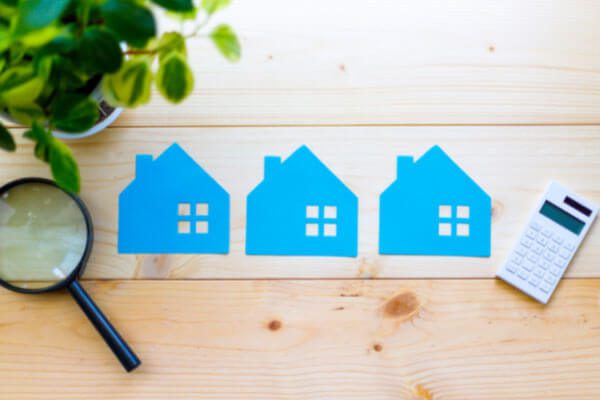
Real Estate Predictions: We know for sure in the housing market that there’s not enough new supply for the amount of demand that these millennials are creating.
What is one strategy on being successful in real estate investing?
The more you learn, the better. I interviewed the cutest NFL guy on my show, Devon Kennard. He’s with the Arizona Cardinals. He was darling. When he’s training for football, he’s listening to podcasts. He’s constantly learning. There’s so much free information out there.
What would you say is one daily practice that you do that contributes to your personal success?
Exercise. I have to. I carry a lot of duress from what I do. If I don’t exercise, then it gets in my body. It gets out when I go work out. Especially in nature if I can go paddleboarding, hiking or something like that.
Thank you. This has been amazing. Thanks for all that you offered in this show. That was amazing information.
Thank you so much. It’s always a pleasure.
It’s always nice to hang out.
Important Links
- Kathy Fettke
- Building a $5M Real Estate Portfolio without Stress! – Previous episode on RealWealth Show
- Retire Rich with Rentals
- CityData.com
- RealWealth Show
- Leah Collich – Previous episode
- BlissfulInvestor.com/RealWealth
- Devon Kennard – Previous episode on RealWealth Show
About Kathy Fettke
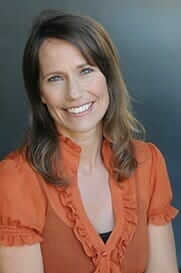 With a passion for researching and sharing the most important facts on real estate and economics, Kathy is a frequent guest expert on such media as CNN, CNBC, Fox News, NPR, CBS MarketWatch and the Wall Street Journal. She is the author of the #1 best seller, Retire Rich with Rentals, and is host of The Real Wealth Show – which is a featured podcast on iTunes with listeners in 133 different countries.
With a passion for researching and sharing the most important facts on real estate and economics, Kathy is a frequent guest expert on such media as CNN, CNBC, Fox News, NPR, CBS MarketWatch and the Wall Street Journal. She is the author of the #1 best seller, Retire Rich with Rentals, and is host of The Real Wealth Show – which is a featured podcast on iTunes with listeners in 133 different countries.
Kathy received her BA in Broadcast Communications from San Francisco State University and worked in the newsrooms of CNN, FOX, CTV and ABC-7. She’s past-president of American Women in Radio & Television.
Kathy became a certified personal coach through the Coaches Training Institute in San Rafael, California. In 2001, she took the coaching process to television and produced a cable show called “DREAM” which followed the process of 6 people going after their dreams over 90 days. Kathy noticed a theme on her Dream coaching show: most people didn’t have time for their dreams when they are spending all their time at work to make money to pay the bills.
Her show sponsor was a real estate expert and the segments they produced changed her life. After interviewing dozens of real estate millionaires, Kathy discovered their best strategies for creating passive income streams. She and her husband bought numerous investment properties and since then learned the highs and lows of investing that can only come from hands-on experience.
She is passionate about learning more and sharing that information with the members of RealWealth and the listeners of The Real Wealth Show. Kathy loves the freedom that real estate investing can bring. She is an avid traveler and enjoys hiking, rock climbing, skiing, figure skating and surfing. She lives in Malibu, California with her husband, Rich, and their two daughters.
______________________________________
To listen to the EXTRA portion of this show go to RealEstateInvestingForWomenExtra.com
To see this program in video:
Search on Roku for Real Estate Investing 4 Women or go to this link: https://blissfulinvestor.com/biroku
On YouTube go to Real Estate Investing for Women
Moneeka Sawyer is often described as one of the most blissful people you will ever meet. She has been investing in Real Estate for over 20 years, so has been through all the different cycles of the market. Still, she has turned $10,000 into over $5,000,000, working only 5-10 hours per MONTH with very little stress.
While building her multi-million dollar business, she has traveled to over 55 countries, dances every single day, supports causes that are important to her, and spends lots of time with her husband of over 20 years.
She is the international best-selling author of the multiple award-winning books “Choose Bliss: The Power and Practice of Joy and Contentment” and “Real Estate Investing for Women: Expert Conversations to Increase Wealth and Happiness the Blissful Way.”
Moneeka has been featured on stages including Carnegie Hall and Nasdaq, radio, podcasts such as Achieve Your Goals with Hal Elrod, and TV stations including ABC, CBS, FOX, and the CW, impacting over 150 million people.
Can Money Buy Happiness With Hal Elrod – Real Estate For Women

Can money buy you happiness? People need money to operate. There are a lot of important things you need to do but without money, you can’t do it. How can you find true happiness in your life? Learn more with Hal Elrod and Moneeka Sawyer as they talk all about bliss. Discover how to be blissful at the moment. Find out whether money is the root of all evil. And, know more about Moneeka’s book Choose Bliss. Listen to this episode and understand how to be confident in anything you do.
—
Watch the episode here
Listen to the podcast here
Can Money Buy Happiness With Hal Elrod
Real Estate Investing For Women
Welcome to February of 2022. How has this year been going for you so far? I felt blissful in this transition from 2021 to 2022. I feel like there has been this slow roll into the new year. Normally, the new year feels frenzy to me. There’s a lot of that masculine go-getter energy that we get. I love the go-getter energy. That’s not a criticism. It feels a bit spastic and forced in the new year. There’s a random date that people feel they have suddenly got to get all these new year’s resolutions and do all this new stuff. It’s not realistic. It’s not based on what their true ambitions are. It’s this contrived idea of who we are supposed to be in the new year.
I have been trying not to do that over the many past years. What is interesting is that if we have that global energy, we all get swept in it too. Whether we in our own lives do it or not, that energy is still there. It impacts and influences us. What is fun this year is that I have felt the slow, gentle flow, like the flow of a river into this new year. I loved it. Surprisingly, I feel like I have been more productive in January of this year than ever before because it feels so natural like it’s where I’m supposed to be. I hope that you guys are feeling that same energy. I’m feeling that globally. I hope you are feeling it too. I hope that so far, your year has been amazing.
As we move forward, I wanted to share with you a show that I did a while ago with Hal Elrod. He is the author of The Miracle Morning. I know many of you love that episode. I got great responses. I was also on his show and we talked about, “Can money buy happiness?” which is the ultimate question I get all the time. People are like, “Moneeka, do you think that money can buy you bliss?” I have got all sorts of responses to that.
I thought it might be fun for you to read Hal and I talk about this and our meeting of minds on this and also the places where we don’t necessarily agree. It was a great conversation. Hal’s podcast is called Achieve Your Goals. I thought it was appropriate to be talking about goals and how money impacts those goals early in the year as we are moving into this year. I hope you enjoy this show as much as I enjoy doing it. Hal is fascinating. I love him and I hope you love him too. Enjoy the show.
—
In the show, we interview successful individuals. Success and successful are two words that are loaded words. I want you to define what success is for you. Is it happiness, health, financial freedom, the impact you make in the world, the legacy you leave or all of the above? For me, success is all of the above and then more that I didn’t even mention. We are going to approach success in a different way. If I was summing it up in one word, success in the context of this conversation that you are about to read with Moneeka Sawyer, in one word, success is bliss.
Moneeka Sawyer is often described as one of the most blissful people you will ever meet. She is a real estate investor. That is her profession and trade. She has been doing that for many years. In the last couple of years, as you can imagine, if you have paid attention to the real estate market, I know mine when it crashed in 2008. That was the lowest point in my life where The Miracle Morning was born from that adversity. She has seen it all. She has been through all the different cycles of the market. She turned $10,000 that she started with into over $2 million. It’s part of the bliss for her. She is working only 5 to 10 hours per month with very little stress. We will talk more about this.
I always say, “In life, you can be stressed out or blissed out.” I say that from the stage all the time. I also say, “It has nothing to do or very little to do with what is going on around you and everything to do with what is going on inside of you.” While Moneeka was building her multimillion-dollar business, she has traveled to over 55 countries. She dances every single day. It’s part of her bliss. She has spent lots of time with her husband for many years.
She is also the international bestselling author of the multiple-award-winning book, Choose Bliss: The Power and Practice of Joy and Contentment. She is the Host of the show Real Estate Investing For Women. I was on her show and she laughs a lot. She is happy and healthy. She has been featured on stages, radio, podcasts and TV stations, including ABC, CBS, Fox and The CW, impacting over 100 million people. We are going to make it 101 million-plus people as you read this show. Moneeka, welcome to the show.
Hal, thank you so much for having me.
In life, you can be stressed out or blissed out and it has more to do with what’s inside you than around you.
You are welcome. It’s a pleasure. I was on your show a while back. Occasionally, I’m on a show and I love the energy so much of the host that I go, “Will you come on my show? Will you bring that laugh, bliss and message that you have to the Achieve Your Goals readers?” I’m grateful that you are here. It’s a word list that is so rich with meaning. I want to ask you for your definition. A lot of people ask me when I’m on their show, “How do you define a miracle? That’s a loaded word.” Bliss is a mysterious word and maybe loaded. What is bliss as you define it, Moneeka?
Bliss is not just being happy. It’s a much deeper sense of joy, contentment and absolute confidence that you can handle anything that comes your way. It’s all about emotional mastery and emotional resilience. This is one of the things we connected on also on my show. I always say, “You can’t control what happens on the outside but you must control what happens on the inside.”
It sounds like you and I are pretty like-minded. I like that. They say there are no new ideas. I have been studying metaphysics a lot lately. I have been studying the collective field of consciousness. It’s interesting that I often will talk to somebody like you or read a book. I’m sure you experienced this when you were reading something. You have an idea that you feel is an original idea that you have never heard of and then you realize, “That was in Think and Grow Rich 100 years ago. That was in the Bible.”
It’s the collective field of consciousness of intelligence that we can all tap into if we want to. Bliss is happiness and joy. You talked about emotional resilience and emotional mastery and what happens inside of you versus what happens outside of you. It’s that old phrase, “They practically wrote the book on this. No, you wrote the book on this.” You wrote the book, Choose Bliss. How did you come to this idea of bliss?
I was born in a part of America where I was the only person in school that was not White. Due to that, as a young girl, I was bullied, humiliated and tormented constantly. I learned early in life that life was hard, that people weren’t going to like me and that I was all alone. You can imagine that’s not a blissful or happy place to be. As I grew up, the torment became much worse. It got violent and there were some horrible things that happened that boys do to girls.
After all of that, I was in a car accident where I was sitting at a red light. A guy was going 50 miles an hour and smacked me from behind. I became a cripple and was told that I was never going to walk again. That’s not horrifying enough but what you don’t know is that I had been dancing since I was three years old. My deepest dream was to become a professional dancer and now here I was with no legs.
I know that you can relate to this story. I went through this period of, “I’m not going to be in a chair. I’m not just going to walk again. I’m going to dance and compete again.” I went after it. I saw the right doctors. This was in the years when there was no real holistic healing. I still would see a chiropractor, acupuncturist and all these healers but it never got better.
What age was the accident?
I was 21. Things weren’t getting better. The pain was still completely overwhelming. As I realized that things were not getting better about a year in, I started to feel hopeless like, “I can’t see the light at the end of the tunnel. It’s not getting better. I’m not able to find my path.” I started to fall into a very deep depression. I remember it had been about a year of me sinking down this hole where I was still in so much pain. One day, I had been in bed for about a week and crying. I had the covers pulled over my head. I don’t know if anybody else can relate to this. I’m so depressed.

Can Money Buy Happiness: Bliss is not just being happy. It’s a much deeper sense of joy and contentment. It’s the absolute confidence that you can handle anything that comes your way.
I woke up this one morning and heard my mom’s voice in my head. She said, “Get out of bed and go get some air. You will feel better.” I said, “Thanks, mom.” I pushed the covers off my head and swung my legs around to get out of bed. As I tried to stand up, I fell to the ground because my legs were too weak to hold me. I sat there on the ground. I pushed myself up against my bed and cried. At that moment, I prayed and said, “God, it never gets better. It keeps getting worse and I can’t keep going this way. Have mercy on me. Either take me home or teach me how to live.”
About an hour later, a girlfriend who I had not heard from for over two years randomly called. She was the answer to my prayer to God. She asked me how I was doing and turned me on to a coach named Ted. Ted saved my life. As we started chatting, he reminded me of my tenacity and strength. He reminded me of my constant search for happiness and all the things that I had learned. He added some of his own new skills and together we brought me back. It was amazing.
You make a decision to live and be blissful but then you have to go through the journey to get there. It was not an easy journey but once the decision was made, I went for it. I started to experience life in a way I had never experienced before with so much joy and bliss, where before I thought, “Happiness is so fleeting. It was dependent on if I had no pain or if someone I loved was near me or if I had the right things or was around the right people.” In those days, I thought happiness was fleeting. Now, I could see that bliss was about what was going on inside of my mind, heart and soul.
Ted was so excited about my recovery. He hired me on as a bliss mentor underneath him as a coach and I started dealing with his executive clients. It was funny because I would talk to these guys. They are super successful. How do we define success? I know there are lots of different definitions. They had tons of money, the perfect house, perfect marriage, cute kids, an adorable dog, a white picket fence and a nice car. They had it all. As we talked about why their business was failing, what we found is that they were no longer happy. They were not motivated, inspired and creative.
I took my lifelong journey and all the skills I had developed and what Ted taught me. I started to teach these amazingly successful men how to find joy again. That’s how I came to bliss and moved into my work. That’s why I wrote my book because the thing about coaching is I can only reach people one-on-one. Speaking in groups, I can only reach so many people but a book can and has reached millions of people to create bliss around the world.
I don’t know if I’m the male version of you or you are the female version of me.
I have that same feeling. It was amazing.
Coaching can only reach people, one-on-one or in groups. But a book can reach millions and millions of people.
In an accident, I did some inner work. I discovered a better way to live free from emotional pain and be blissed out, happy and grateful. Authentically, it’s all of those things and then the feeling of responsibility, “How we could impact the world is to put it in a book.” I wrote The Miracle Morning. You wrote Choose Bliss. I’m getting chills at how aligned our stories are. It’s two souls that are on a similar journey. It’s very cool.
Let’s start with this and get actionable. I’m only practical and actionable. Too many teachers, messengers, authors and whoever are very philosophical. They teach you philosophy, which can be helpful but if it’s not actionable, you don’t change your behavior. You often forget the philosophy or life gets in the way of the philosophy or your emotions get in the way of the philosophy. With all that said, give us one tip that we can use to be more blissful.
This is my favorite tip to give people because it’s actionable and usable even as you are sitting with me. Maybe you are driving a car and then suddenly someone cuts you off. You get irritated. You can feel this emotion happening. This can happen in lots of cases whether it’s at work or you got cut off. I’m going to use the cutoff one because a lot of us can relate to that. When you are in a moment where you are not blissful and you are the opposite of blissful, you can create a bliss moment.
This is what you do. Someone cut you off in traffic, let’s say. All of a sudden, you are upset. Why are you upset? It’s not because of what happened. It’s the meaning that you give that. Suddenly, a story happens in your mind about, “I can’t believe they cut me off. What if they had hit me?” All of these stories happen in your mind. That’s what causes the stress.
This is how you do a bliss moment. You stop those stories in your mind and do a complete interrupt. For me, I will say, “Moneeka, stop.” I literally interrupt the thought and then I drop into my body, roll my shoulders back a little bit, relax my body and take a couple of deep breaths. Now, you are in a place of being grounded, centered and compassionate. You can approach your life with whatever decision or situation. Whatever you are doing, you can approach that situation from this place of heartfelt bliss.
Let’s say something happens. Somebody cuts you off and you are upset about it. I’m following your process. I interrupt the thought, “Hal, knock it off. This is not productive. Being upset is not going to fix it. There’s no point in being upset. Take that deep breath and get centered in the body.” What if the mind is not obeying? One thing is we are programmed. You can study at a neurological level that there are pathways in the brain. Our brain fires off the same way it fired off last time somebody cut us off in traffic. We keep living our life on repeat.
If somebody does that and they interrupt the pattern, they get into the body and get centered through breath and relaxing the shoulders but they still feel that emotion coming up. Is there any self-talk? Is there more physical work? For me, what you are saying is you are preaching to the choir. If somebody is reading that’s like, “That sounds easier said than done,” that’s what I’m thinking. What would you say to that person? How would they implement this?
First of all, it is hard because we are hardwired to act a different way. It may not work the first time. The first thing that I will say to you is to keep practicing because practice will make perfect. It may not help the first time but once you practice it ten times, you will start to see it. Maybe it’s not even ten. Maybe it’s 1, 2 or 3. You will start to see, “It is having an impact.” If it was easy, everybody would be blissful. We have to focus on this and make it a priority. It’s not always easy. Anything worth having sometimes you have to work for. It’s okay if it does not work the first time.

Can Money Buy Happiness: To create a blissful moment, you need to stop those stories in your mind. Then drop into your body, roll your shoulders, take a couple of deep breaths, and relax.
Here are some things. First of all, don’t beat yourself up because it did not work. Like just know, “I need to get better at this.” You practice it again next time. You can turn this into a game. Start looking for those moments that you can utilize this technique so you can practice it so that it starts to build the neural pathways in your brain of how you react like, “I’m upset about that.” Here’s another natural thing that people are like, “I’m upset and I deserve to be upset. That was wrong.” You do have a right to be upset. How does that make you feel and perform? Is that what you want in your life even if you have a right to it? Is it useful? Is it going to make you blissful?
I want to follow up on that. We teach a similar lesson. Truth is truth, especially if you have been through what you and I have been through and the car accident being told you are not going to walk again. Either you let that destroy you emotionally and you become the victim or you rise above it and you learn how to manage your emotions in such a way that adversities don’t deter you in a major way. For me, I teach what I call the Five-Minute Rule, which says, “It’s okay to be negative when something goes unexpected or not according to plan or it’s painful or difficult.”
Set your timer on your phone for five minutes. You get five minutes to bitch, moan, complain, cry, vent or punch a wall. I’m going to say the same thing, “Get into your body and take a deep breath.” You say three liberating words, which are, “Can’t change it.” It’s not that you can’t change the future. It’s that you can’t change the past. That already happened. You can’t change it.
When I learned this, I was nineteen. It was in my sales training. I shared this with audiences because I go, “Raise your hand if you think five minutes is not quite long enough. You need at least a Five-Hour Rule or maybe five days to be pissed off.” A lot of hands go up. They were like, “Come on, five minutes? I’m starting to get upset at five minutes. I’m barely scratching. I’m just getting riled up. My face isn’t even as right as it’s going to be in about ten more minutes.”
That’s the thing. When I learned this, I thought five minutes was not enough and I needed longer. Sure enough, the first time I had a customer cancel an order, it was my biggest order of the week. It was the last day. It helped me hit my goal and now I failed my goal because I lost the order. I set the timer for five minutes. The timer went off five minutes later. This was a week into my sales career. I’m so mad and the timer goes off. I’m ready to throw the phone. I go, “I’m still mad because five minutes went by. I’m still upset.”
It was probably a few days in. It was maybe after a week. I don’t remember the exact day but here’s what happened. It creates what you are talking about. This is conscious awareness. Either you are reactive or proactive in terms of the meaning that you are giving to the things in your life that are not pleasant, desirable or you did not expect or want. The idea is that when the timer would go off the first few times, it was not enough time. Each time, I was being consciously aware, “There’s no point in dwelling on something I can’t change. There’s no point in staying upset.” You can be stressed out or blissed out. It doesn’t matter what is happening to you. As Moneeka said, you give it to it and you respond.
There’s no point in dwelling on something you can’t change. There’s no point in staying upset.
What happened is I can picture the moment. I was in my apartment. I had another woman cancel an order. It was the last day toward my goal. I set the timer for five minutes. I got up and I was like, “I can’t believe she canceled that order. I needed this so bad. I have no time to make up for this.” I picked my phone back up and I had 4 minutes and 32 seconds. I went, “What is the point of me being upset for another four and a half minutes? I could turn the timer off and say, can’t change it, accept it, be at peace with it and schedule more appointments. That seems like a better use of my time and energy.”
The Five-Minute Rule, within a matter of a week, turned into the Five-Second Rule where I’m like, “I need to vent for a second. There’s no point in changing it.” I love what you are saying. I played that devil’s advocate of like, “What if you do that? You interrupt your thought pattern, get centered in your body, relax the shoulder, take a deep breath and then give yourself permission to feel that bliss. What if you are still upset?” For me, that was it.
After a matter of days or a week or so, I realized I was reconditioning the meaning that I have been giving to adversity my entire life, realizing, “I’m not a victim. It’s not a life sentence that whenever something happens that I did not want to happen, I have to be upset about it until I forget about it.” Anytime they think about something, it makes them upset. They get upset whether it happened five days, five months or five decades ago.
People do carry it for five decades. It’s still there for you. It’s like, “Is that still serving you?” I asked you to be on my show because I listened to some of yours. I love this Five-Minute Rule thing because one of the things that I used to say is, “You do have a right to your emotions.” Like you say, truth is truth and sometimes things suck. That’s the truth. Give yourself a time limit where you get to honor your feelings. You get to honor them, live them and be them. Commit to yourself that you will turn it off and commit to your own happiness again in order to move forward.
For me, I left it for people to look inside at what that time limit is whether it’s a day, an hour or a couple of days. If someone dies, maybe you want a month. I love the way you took it from this pick to, “Try this. Just do this.” If something horrible happens, you may still be there for a while. You may still be there for a month. If your intention is to only be there for five minutes, you are so much more likely to succeed at getting back to bliss than if you will not have that intention to get back there in a timely fashion.
The thing is you might as well choose bliss in the midst of your adversity. That’s the difference. People think it’s mutually exclusive like, “I feel bad because bad things happen.” You feel bad because you are not willing to give yourself the gift of acceptance and being at peace with the “bad thing” that happened.
When you talked about can’t change it, the motto that I have used is, “I am at complete peace with exactly how my life is today.” That’s always my motto.
You believe wealth is important to bliss. I do as well. I would love to hear why you think that is.
It has been scientifically proven that people that struggle with money are not happy. It has also been statistically proven that once we can pay the bills and we are comfortable, we tend to be happier. What happens in the world now, especially in our business world is so many people are out there with a real message. They are just not out there to make money. I’m sure that this is true with many of your readers. They are out there to change something and do something important.

Can Money Buy Happiness: Money causes a lot of divorces. It’s the stress of not being able to provide for your family. But you don’t need to be rich, you just need to be able to provide for yourself and the necessities of life.
The honest truth is, it’s hard to do things that are important if you are broke. You need to have wealth supporting you, creating your foundation and taking care of you so it’s not taking up your mind real estate so that your mind real estate can be focused on your passion. It’s the things that you want to do in the world. It’s your message. The more wealth you have, the more good you can do. To the point where you are paying the bills and surviving, it’s going to affect your actual happiness and bliss. Creating more wealth does help to support you in creating more bliss in your own life because it allows you to be authentically who you want to be in the world in the biggest way possible.
One of my mentors used to say, “Money is not the root of all evil. It does not make you a bad person. It makes you more of what you are. It’s the grand amplifier.” If you are a good person, money is a tool for you to do more good in the world. If you are a jerk, money is a tool for you to be a bigger jerk.
That’s why I focus so much on bliss because I want people to experience bliss through that journey. Who they become as they are building wealth is who they get to be when they are wealthy. That’s who they amplify in the world. We are so aligned on that because you don’t want to be amplifying the parts of you that are not the most beautiful parts. As a blissful person, you can amplify that bliss through your work in the world. That’s the important thing.
There’s a very cliché saying that money can’t buy happiness. Would you agree with that? Would you say that money does buy happiness?
It does buy happiness in the way that I talked about. For people who are broke, it’s a lot harder to be happy. Let me qualify this. I don’t believe that we have to be rich or be at the mercy of everything around us to be happy. We have already talked about that. What I will say is that being in pain makes it more difficult to be blissful. It’s harder work. If you are physically, emotionally or financially in pain, you are going to have a harder time finding happiness. It doesn’t mean it’s impossible. It means that it’s less probable.
You put it out there, which studies show it’s proven. Here’s one context of many. What is the number one cause of divorce? It’s money problems. It’s the stress of not being able to put food on the table, put the roof over your head or pay your bills. It’s the stress that it causes. In the context of a marriage, it breaks the marriage. I like that you said that. You are not saying that you need to be rich but it’s being able to provide for yourself and the necessities of life.
The beauty of it is if you want to live off the land, you might not need any money. It’s almost like you could say it’s resources that you need. You need resources to support your lifestyle. For most of us, money is one of those resources. If you live off the land, hunt your food, live in a hut and don’t have any property taxes, you don’t need money but you do need resources.
What about your future? If you live off the land but you don’t want your children to have to live off the land. You want to send them to college. Money becomes important again. I don’t know whether it’s fortunate or unfortunate but money is our transactional way of creating life and it creates our future. It creates our possibilities. Having it at your disposal gives you more options, possibilities and opportunities.
It does all of those things. It’s the freedom to do what you want with the money that you have. One of my best friends and my business partner is Jon Berghoff. He is wise beyond his years. He is younger than I am. He was in his twenties when he said, “Money is just energy. If you want to put that energy toward providing water for people that don’t have water, that’s what money allows you to do or food for people that don’t have food. They don’t have the means to earn their own food because of maybe the culture that they live in, where it’s not a capitalistic culture. They can’t go out there and earn their own money. Their hands are tied.”
Money is not the root of all evil. It makes you more of what you are. It’s the grand amplifier.
Whether it’s good or bad, right or wrong, I have mixed opinions. In capitalism in some ways. It’s another conversation. Part of me is like, “We should get further back and regress to primal times where we are living off the land. We are not competing for who has the biggest car or all of those things.” I might write a book that they called prehistoric parenting, getting back to what works or something like that. The point is the reality is the culture that we do live in. If somebody is sick, they have bills.
I have a friend. She is a single mom and she has cancer. It’s so sad. She was a teacher and the school let her go because of her appearance. She had lost all her hair and a lot of weight. The parents were afraid of saying their kids were afraid of her. She is the sweetest and most selfless human being on the planet. She almost dedicated her life to being an underpaid teacher. She was trying to teach between her chemo treatments. They had to let her go because the parents were frightened by her appearance.
Her hospital bills are $12,000 a month. She can’t support herself and she has no help. I’m paying her bills. It’s like, “Is money bad? Is money the root of all evil? Does it allow you to help people who are in need of that help and support?” We belabored that point. I read a great book years ago called The Soul of Money. I talked a lot about that. There’s the idea that money is not bad. It’s what you do with it. It can be one of the most beautiful things in the world.
What meaning are you giving to it? You have control over that.
What is your book Choose Bliss about? We have a general idea but I would love to hear how you explain it. Where is the best place to get it?
I was an executive coach for over a decade and I tried a lot of different strategies. There were strategies that worked well for me. There were strategies that worked for every one of my clients. I compiled all of those strategies into my book, Choose Bliss. Guess what the first one is? Create your date with your morning routine.
I was going to say it’s got to be the morning ritual.
It would be some morning routine. It’s another way that we are totally aligned. That’s what Choose Bliss is. It’s written as my story so you get to know who I am and where I’m coming from. There are a lot of good actionable strategies because I’m like you. The theory is awesome. It does not get the job done. You need to get the job done. Bliss is about taking action. That’s what the book is about.
Is it safe to say that if you love The Miracle Morning, you are going to love Choose Bliss?
I absolutely think so. I think we are totally aligned.
Moneeka, you are blissful to talk to. Your energy comes through in your voice and laugh. You have such great energy. I’m very sensitive and in tune. I feel like with people’s energy and yours is blissful. Thank you for doing what you are doing in the world and sharing your bliss with our readers. Where can people learn more from you and about you? Tell me the name of the show again. I know you have a website. Where can people follow and keep up with you?
Choose Bliss is available on Amazon. That’s the one place. You can go to BlissfulInvestor.com to find out more about me and what my philosophy is about wealth. The show is Real Estate Investing For Women. I know that it’s real-estate-focused but it’s a very holistic approach to wealth. We talk about mindset, heart set, strategies and money smart. It’s the whole picture of creating success.
I will give a little tangent soapbox. You may have heard me say this before or you may not have. I’m a big believer in passive income. That’s a word that can sometimes even be a cringe word where you go like, “Get-rich-quick and create passive income.” When I was in the hospital fighting cancer, I had passive income from the thirteen books I had written and the 30-some translations of The Miracle Morning. Every single one of those, I got checks all year long and it supported my family.
I truly believe that’s one of the most important things that you can do if you live in our society, where you need income to put the roof over your head and buy your food if you are not living on the land, which is probably 99.9% give or take of our readers. Creating passive income is what I like, Moneeka. We did not focus on that. Go to Moneeka’s website. It’s for women but I would imagine men could probably implement the same investing strategies. I don’t think that it’s like, “You are a man. These won’t work for you.” It’s investing in real estate unless you are going to be an author.
The thing about writing books and making money off your books is it’s much harder. I’m very blessed, fortunate and lucky that my books have generated significant income because it’s not common. It’s harder to duplicate. When I’m coaching clients or talking to friends, they are like, “How do I create passive income? Should I write books?” One of my best friends in the whole world is Matt Recore. He is already retired at 35 by investing in real estate. He is still going.
It truly is the easiest way to create wealth and passive income.
My other best friend is David Osborn. His net worth is $100 million and it’s all from real estate investing. In terms of bliss, wealth is a big part of that financial freedom. You don’t have to be rich but financial freedom does bring such a quality of life where you are not stressed about it. Check out Moneeka’s stuff at BlissfulInvestor.com and the Real Estate Investing For Women Show. Check out the book on Amazon, Choose Bliss: The Power and Practice of Joy and Contentment.
If you do want to join me in person for 2 to 3 life-changing days, I’m going to start talking more about this because we are getting into the time where it’s time to start looking. Tickets are on sale for the Best Year Ever Blueprint Live Experience. You can check that out at BestYearEverLive.com. This is our sixth year and we have 350 spots. They are already spoken for but that means there are about 100 tickets available. You can check that out. I would love to spend a few days with you on December 13 through 15 in sunny San Diego, California. Moneeka, thank you for being on the show. I appreciate you.
Thank you so much for having me. This was amazing.
I enjoyed our conversation. Goal Achievers, I hope you enjoyed it as much as I did. Until next time, go out there and achieve your biggest goals and dreams because you absolutely deserve nothing less. I love and appreciate you. I will talk to you soon. Take care.
Important Links
- The Miracle Morning
- Achieve Your Goals – Apple Podcasts
- Choose Bliss: The Power and Practice of Joy and Contentment
- Real Estate Investing For Women
- Think and Grow Rich
- The Soul of Money
- BlissfulInvestor.com
- BestYearEverLive.com
About Hal Elrod
 Hal Elrod is on a mission to elevate the consciousness of humanity, one morning at a time. As one of the highest rated keynote speakers in America, creator of one of the fastest growing and most engaged online communities in existence and author of one of the highest rated, best-selling books in the world, The Miracle Morning—which has been translated into 27 languages, has over 2,000 five-star Amazon reviews and is practiced daily by over 500,000 people in 70+ countries—he is doing exactly that.
Hal Elrod is on a mission to elevate the consciousness of humanity, one morning at a time. As one of the highest rated keynote speakers in America, creator of one of the fastest growing and most engaged online communities in existence and author of one of the highest rated, best-selling books in the world, The Miracle Morning—which has been translated into 27 languages, has over 2,000 five-star Amazon reviews and is practiced daily by over 500,000 people in 70+ countries—he is doing exactly that.
Hal actually died at age 20. Hit head-on by a drunk driver at 70 miles per hour, his heart stopped for 6 minutes, broke 11 bones, and eventually woke from a coma to be told by doctors that he would never walk again. Not only did Hal walk, he went on to run a (52 mile) ultra-marathon and become a hall of fame business achiever—before the age of 30. Then, in November of 2016, Hal nearly died again—his kidneys, lungs, and heart on the verge of failing, which led to his being diagnosed with a very rare, very aggressive form of cancer (acute lymphoblastic leukemia).
After enduring the most difficult year of his life, Hal is now cancer-free and furthering his mission as the Executive Producer of The Miracle Morning Movie—a documentary that both shows you the morning rituals of some of the world’s most successful people, as well as takes you around the world to show you the life-changing impact that Miracle Mornings are having, globally.
Hal is also host of the highly acclaimed Achieve Your Goals podcast, creator of the Best Year Ever Blueprint Live Experience, and bestselling author of ten [10] books in The Miracle Morning book series.
As one of the most inspiring, highly entertaining (we’re talking “wannabe stand-up comedian” level humor!), and one of the most in-demand keynote speakers in the world, whether you are an individual or an organization, Hal will give you the tools to Wake Up to Your Full Potential.
______________________________________
To listen to the EXTRA portion of this show go to RealEstateInvestingForWomenExtra.com
To see this program in video:
Search on Roku for Real Estate Investing 4 Women or go to this link: https://blissfulinvestor.com/biroku
On YouTube go to Real Estate Investing for Women
Moneeka Sawyer is often described as one of the most blissful people you will ever meet. She has been investing in Real Estate for over 20 years, so has been through all the different cycles of the market. Still, she has turned $10,000 into over $5,000,000, working only 5-10 hours per MONTH with very little stress.
While building her multi-million dollar business, she has traveled to over 55 countries, dances every single day, supports causes that are important to her, and spends lots of time with her husband of over 20 years.
She is the international best-selling author of the multiple award-winning books “Choose Bliss: The Power and Practice of Joy and Contentment” and “Real Estate Investing for Women: Expert Conversations to Increase Wealth and Happiness the Blissful Way.”
Moneeka has been featured on stages including Carnegie Hall and Nasdaq, radio, podcasts such as Achieve Your Goals with Hal Elrod, and TV stations including ABC, CBS, FOX, and the CW, impacting over 150 million people.
Fighting Cybermonsters™ With Mindfulness With Sandra Estok
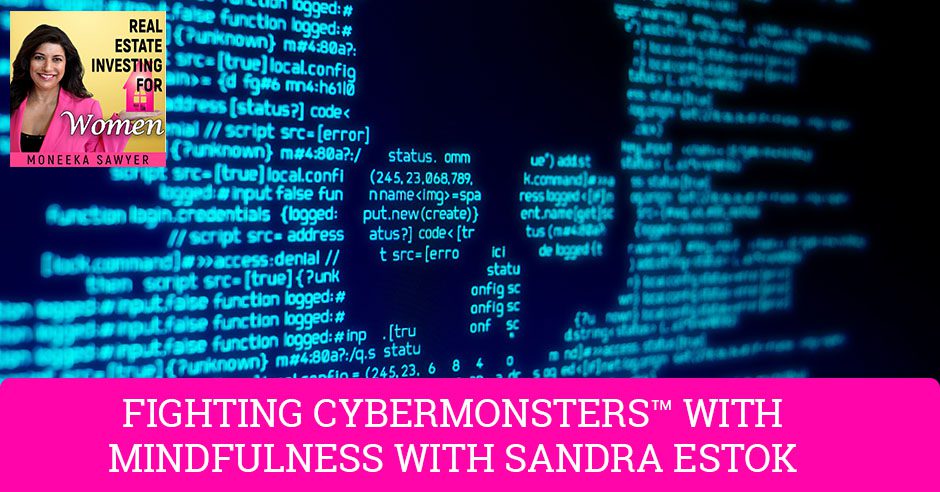
Technology is present in everything you do, which means no one is safe from cybercrime. This is why you need to practice mindfulness because hackers will try every trick to get to you. Join Moneeka Sawyer as she talks to Sandra Estok about cybercrime and cybersecurity. Sandra is the Founder and CEO of Way2Protect where her main goal is to simplify cybersecurity for everyone. She is also the author of Happily Ever Cyber!. Listen to this episode to fully protect yourself from all the cybermonsters™ out there.
—
Watch the episode here
Listen to the podcast here
Fighting Cybermonsters™ With Mindfulness With Sandra Estok
Real Estate Investing For Women
I am so excited to welcome to the show, Sandra Estok. Sandra, Founder of Way2Protect, is a cybersecurity keynote speaker, corporate trainer, and author of the international bestselling series Happily Ever Cyber. Through her publication, Sandra is committed to share her journey, experience and expertise, using simple concepts and inspirational stories to help others protect what most matters to them against hackers, scammers and cybermonsters.
She brings years of multicultural and cross-functional experience in the US, Latin America and Europe in the areas of cybersecurity, IT and data privacy. Sandra has held numerous positions in Fortune 500 companies, private and public organizations. Sandra holds an MBA, Industry Certificate in IT, cybersecurity and data privacy.
—
Sandra, how are you? Welcome to the show.
Thank you so much. I am so excited to be here with you.
This is such an interesting topic. I never even considered having anybody talk on this show about this until I met you. First of all, most people talking about cybersecurity make my brain feel like it’s going to blow up. They are often very boring, which you are not. I see a lot of relevance with regards to real estate. I’m excited about what you are going to be talking about with your relationship to real estate. Before we even get into that, could you tell us your amazing story about how you even got into this?
It started many years ago. I was returning from visiting my mom when I was in Columbia. As we were landing in Miami, the pilot announced that Homeland Security Officers were boarding the plane. I hand in my passport with my work visa. The next thing I know, I’m the only one being marched off the plane and thrown into a room. That room exists in every airport and every country. There is a room. I was escorted there. There are no phone calls. I don’t know what’s happening. My husband was waiting for me in Chicago and I’m about to miss my connecting flight. Ten hours later, they handed back my passport and it was revoked.
I did not know what was happening. A few weeks later, I’m back in Venezuela, where I am from. I have everyone supporting me. I have attorneys. We are in the interview trying to get a new visa. In this interview, the officials kept asking me about China. They were like, “Why were you in China? Who do you know in China? Who is your contact?” I don’t know what they are talking about. I have never been to China. Somehow, a smuggler in China got ahold of my information and has been smuggling women into the US using my identity.
Any industry that has money, big or small, is a target of cybercrime.
I convinced them that I’m not a small smuggler. I get my new visa. I come back home and everything is okay. Two weeks later, I’m returning from Europe. My job was to travel. That was part of her idea at the time. I’m returning. I get off the plane. I get to passport control and I’m right back into the same room because I have to prove that I’m the real me over and over. Every time I travel for six years. When I go, my name and everything was in Chinese. I had the import and export companies under my name. Nobody wanted to travel with me, not even my husband.
Finally, I got my US citizenship, passport and my new name. I changed my name. A year later, I entered the world of cybersecurity after I got my US citizenship. At the time, I did not realize what happened to me. I was like, “This is probably normal.” This was back in 2006. We didn’t have a lot of news about cybersecurity. It was not every day we see it now, back then was not. Being only IT, I did not connect the dots. A year later, I joined and it blew my mind. Understanding the cybermonsters, we can talk about that later, but understanding how it works, what, why, how and who is behind all the cybercrime. It became a passion.
I was in the corporate world for a long time. The more I learn about cybersecurity, the more I got passionate about it. The more I wanted to share that passion differently. I had many different positions and having building a team or building a program and teaching the employees of those companies that I worked for. I discovered that I enjoy that part. It is boring, it is not something appealing. Nothing is exciting about cybersecurity. That is what I want to change because the reality is identity theft or cybercrime can happen to any of us. Unless we know how and what to do, it could happen to any of your audience or you as well.
Many people in my family have experienced identity theft, not cybersecurity and such. It’s a big deal. It happens to so many people. Cybersecurity, we don’t think of it on a small scale. We think of that as that happens to the big companies, those are the targets. I would contend to say that the onesies and twosies, us that’s normal person people or consumers, we are the bigger target.
Forty-three percent of all the hacks in 2021 happened to small businesses. If you think about the industries like the financial industry, healthcare and small businesses. You can include all companies from 0 employees to 1,000 employees. That is usually considered small businesses or 2,000. Forty-three percent of all the hacks happened there. Real estate, your industry, is one of the industries that is impacted because any industry that has money, it’s a target. It’s a good place for hackers to get what they want. It’s either your identity or the way to impersonate you so they can get what they want from you, which in most cases is money.
Talk to me a little bit about how your approach is different from cybersecurity.
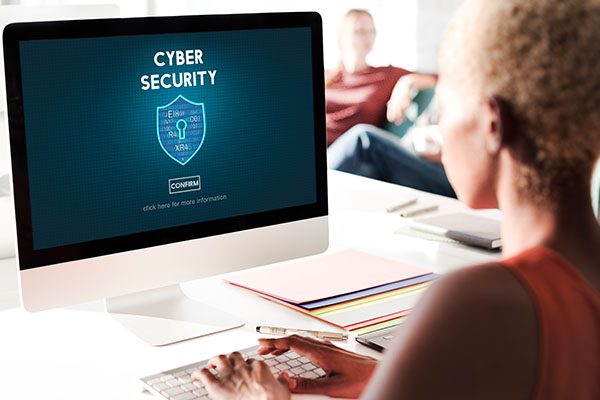
Cybermonsters™: The topic of cybersecurity is not appealing. There’s nothing really exciting about it. That has to change because the reality is cybercrime can happen to anyone.
It starts with that realization that cybersecurity is very personal. Everything that we do every day in our lives somehow relates to technology. Why my approach is different is because I’m using that personal connection or stories that we all have and connecting them into the cybersecurity, cybercrime and identity theft world. I didn’t even realize that, but throughout my life, many things have happened to me that connect to cybersecurity in a way.
I’m a cyclist. I do yoga. My identity was stolen, but somehow each part got a connection. That is what I want to share because this is not my story only. The most amazing thing that happens to me when I share either the stories or training is that each person discovers their story. When we start making that connection that cybersecurity becomes personal. It’s not something super technical. I don’t have to be a geek. There are many things we all can do to reduce the chances of identity theft and cybercrime every day. That is the muscle that I want to develop and all of us to start training. When we see it that way, it’s not overwhelming anymore.
Could you tell us the biggest misconception that people might have about cybercrime?
It cannot happen to me because I’m not rich. In real estate, for example, I’m just selling a small house or I’m renting this property. It won’t happen to me. The reality is it can happen to anyone. The amount of scams that happened, especially in your industry in 2021, $149 million were lost in scams related to real estate. There are so many parties involved. In this case, you have a buyer, seller, titles and you have all these many companies. If every person in that chain thinks, “It won’t happen to me.” Unfortunately, if it happens to at least one of those all parties involved, your whole deal could be in jeopardy. That is where the loss happens. The money does not go to the seller, it goes into a different country and you can recover it.
Thinking that it won’t happen to you is one misconception. The second misconception is thinking that it’s all about technology and technical. When we were kids, we learned how to cross the street. We learned how to look both ways. We learned probably not to stick things into electrical outlets. I learned that I should not be doing that. In the same way, if you think about cybersecurity, there are things that are common things that we all can do that can reduce the chances of becoming a victim of cybercrime. The misconception that it is only technology is not true.
When we have a phone call for a deal, you are expecting a transaction to happen in your selling or buying a property. Someone calls you and says, “Your Social Security or any of the information that is related to that property. We are going to validate that. You are going to get the best rate on your mortgage. You are going to have the best deal that you can have for these new investments.” Most of us can recognize that it is a scam, and most of the time, we hang up because they are easy to spot. You know that the IRS is not going to call you. The Social Security surveys are not going to put you in jail.
Most of us have developed that. When we see a call and it’s a scam, we react to it and we hang up. There are many other things like that we will start developing. One common thing is using your password and using one password that has meaning to you. I do yoga and I do all these things. I use a password with an intention and affirmation. It helps me to get centered.
A common misconception about cybercrime is that it’s all technology and all technical. That’s not true.
A password, you won’t think that it could be used in a fun way. You might think it always has to be a lot of characters and boring but you could use that password in a way that has meaning to you. If you are an investor or buying a property and you want a big house on the beach or you have a dream of something bigger for your life, you could use your password in a way that gets you to that dream.
That is a super tip right there. I use that one. My password is also a declaration of how I’m feeling or something that I want for the future. What is funny about that is that normally, you should be changing your password every three months. If it is a declaration or affirmation, it’s fun to change it every three months, too. That is a good security tip is you don’t want to keep the same password for all your accounts. You want to have some different ones that have meaning, but the other thing is you’re wanting to change them frequently. This is a good way to encourage yourself to change them frequently.
A different password for every account is important. I love that you mentioned that. If you get hacked and compromised, you have an account where you have a rental property. You have a password that lets you go into the portals to watch or monitor what that rental property is doing. Somehow, you use the same password for your Netflix account and your Netflix account is compromised. If you are using the same password, your other place where you have sensitive information about your real estate business could be compromised as well.
Using a password manager is one of the best ways to have a very long-phrase with your declaration, but then you don’t have to remember all the other passwords because we have so many other things that we have to do remember and think about. A tool like that allows you to keep track of your passwords and make it easy for you.
Talk to us a little bit more about the password manager. Do you have a favorite? They are going to be a lot of ladies that are reading to this that this is the first time they are knowing it. Tell us a little bit about what that is.
A password manager is a tool and there are many different types, either free versions or paid versions. When it comes to something that protects my password, I would feel more comfortable paying for a service that I know is going to have a more secure solution. This is where one thing that I will caution on free, however, if you are an Apple person, there is a password manager that is embedded into your iPhone or iPad. It is part of the iOS system. There are many other versions and companies that do this. This is their business. A password manager is a tool that you will integrate all of your passwords that are associated with your email address.
If you are using five different email addresses, you can put it into your password manager and it will scan every word you have a password and it will bring that information to you. The good thing is you have a dashboard and you have a tool that will tell you where you repeating the same password. When was the last time you changed that password? How strong that password is?
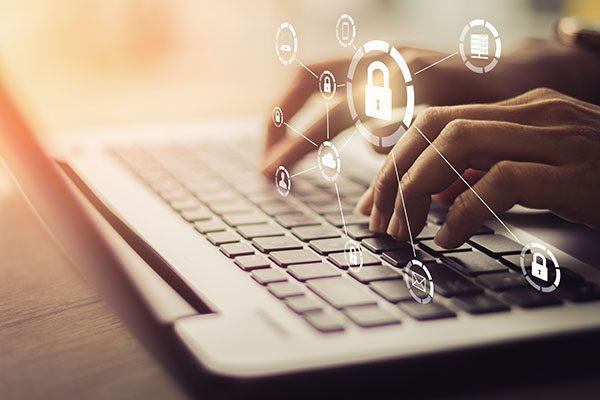
Cybermonsters™: Cybersecurity is very personal. Everything that you do in your life somehow relates to technology.
One simple password of seven characters can be broken in less than point .29 seconds. A password manager allows you to have that phrase, your big declaration, inspiration or affirmation. You change everything once you achieve that declaration. It’s one more tool that you can use because you have to type it so many times. I say that phrase to myself every day, “My password makes me happy.”
Do you have a password manager that you particularly like that you might recommend?
I use Dashlane. It’s one of them, LastPass or 1Pass. What I like about that one is it includes a VPN. It’s a way that makes your connection more private. Think about you are going on a highway and when you are on the internet, there are no roads. All the cars are everywhere. When you are using a VPN, it’s like you are on your own freeway. All the information you are sharing goes only through that tunnel or lane that you are going through. Nobody can enter your lane. Especially in real estate because you do so many transactions that are very important with money.
I will suggest when you do those transactions, you activate your VPN. There are either antivirus tools that will have a VPN included or a password manager will have it or you can have a VPN on its own. Every time you do a sensitive transaction, what I recommend is that you use that VPN service because that way your information cannot be taken. Let’s say you are in a public place and using public Wi-Fi. Unfortunately, when you use public services in the same way you have access to those public services, cybermonsters, hackers or cybercriminals have also access to that.
Even if you are sending a simple email, they can intercept that information. Why is that important for your business and real estate? You are buying or selling a property. You are connecting with your buyer or seller and you are interchanging emails. If I am in a public place and I saw that house went for sale because it’s all public records. It goes to the MLS, you see that. I can start watching the communication between the two parties. When I intercept that information, I can know more details when that close is going to happen.
As that date approaches, this is one way the scams have happened is that the person that is supposed to transfer the money receives an email with fake information on the account, but you are seeing it real because it is impersonating that other person. You talked with that person. If I’m watching your email, watching how you communicate, what language did you use and how do you greet each other, it is easier for me to impersonate that agent, lawyer or person and send you a bank account that it’s not real. It sounds like a movie, but if you search online, you can see how many people have fallen for this. In real estate, many people have lost all the money because it went to a foreign country and it cannot be recovered.
In EXTRA, you are going to be talking specifically about how to protect your email. Ladies, make sure that you stay tuned for that because this is a horrifying story. Are there some other basic things that we can do that can help us to protect ourselves?
You’ll use your password every day, so choose one that’ll make you happy.
I love your show because you have a lot of guests that always are bringing positive, good vibes and there are many different topics. One topic that comes to my mind, which is connected to cybersecurity is mindfulness. If I’m going to do an email, go into social media or do this deal I’m practicing mindfulness and less at the risk of becoming a victim of cybercrime. Something that simple as being present when you do your work can be a game-changer for identity theft or cybercrime.
Give me an example of that. I’ve got about ten that I can give you, but I’m sure you’ve got some good ones.
I love to know yours, too.
Frequently, you will get something that says in your email, “It’s time for you to change your password. Please press this link.” You have to put in your old password and you have to put in a new password. If you look at the page that it goes to, it is not the actual page where you are changing the password. It was masked and it’s different. That is one.
Don’t ever put in a password unless you go to the site. Use yourself, go to that site and change the password there, don’t do it through a link that is sent to an email. The thing is that sometimes we are moving so fast, we are like, “I got to get that done.” You get it done. You move on and then you’re like, “I gave somebody my password.” You go through and you have to change all your passwords. That is one of them.
Another one is entering your email address for a similar situation. You are asked for your email address so that they can send you a verification, but you sent that email address to someplace that is not where you thought and suddenly, your email has been completely hacked. Those are a couple that I know my husband and I have experienced. How about you?

Cybermonsters™: Practicing mindfulness can put you less at risk of becoming a victim of cybercrime. Being present and aware when you work can be a game-changer for identity theft.
Congratulations for being attentive to all of those. Good job on keeping an eye on those emails or those things that can happen. I can give you one example that has happened a lot. It is related to when you do your banking. Most banks will have two authentications or a two-way to verify that you are you. They send you a text message and they say, “Someone is trying to get into your account. Is this you?” Even if you are not trying to get into your account. When you have to sign up for your banking, you will ask to validate that you are you and it will require a PIN that you have to enter to say that is you.
One way that cybermonsters check you out is they will try to impersonate you. There is a lot of information available to all of us for data breaches or hacks. They call the bank and they try to log in to your bank account like you. They are not going to have that PIN. That PIN, they are going to request the bank to send you a new one. When you go to your online banking and you say, “I forgot my password.” It will email or text you that validation. That scammer or cybermonster will call you and say, “We are from this bank. We sent you a verification code.”
You will be surprised how many people didn’t read the entire text. That is a request for your password to be changed. You give that PIN to the person that is calling you to validate. In some cases, they call you and say, “We are seeing transactions in your account. We are going to stop the hacker.” They are pretending that they are saving you when in reality, they are hacking you. Mindfulness is going to so many levels because whatever situation you are in, my advice is don’t take an action. Breathe.
If it is your bank that is calling you. What I will do is I hang up and I take my credit card number or I have my contacts in my bank and I will call them directly. Whatever it is, you can have a few seconds where you can breathe and then think about, “What actions do I have to do?” Call the bank. Call whoever you need to call and validate that the information that you are receiving is valid.
What I love about what you said is often, we will get a phone call from our bank or credit card company, “Is this charge valid? Are you in this location?” We think, “This is an authority. This is the bank. I don’t get my money unless I cooperate with the bank.” What you said is it may not be the bank. It’s okay to say, “Hold on. This is not a great time to chat. Let me call you right back.”
You hang up and you call the numbers that you know. It’s the same thing as verifying where you are putting your passwords online. Make sure you check the URL. I have never done that before. That’s amazing. You can say, “I’ll call you right back or this connection is not good.” You don’t need to be rude, but you do need to take a couple of more minutes. This is going to be more time out of your schedule, but is it worth it?
If you think about that for a few seconds, it can save you. In my case, six years from the nightmare. If you put it into perspective, how much can you lose for making that extra phone call and whatever transaction you are doing, validating what it is that you are doing?
Pick three things you care about the most. Know what matters most to you and start there—no need to overwhelm yourself.
Tell my ladies how they can reach you if they want more of this good stuff.
They can visit me at HappilyEverCyber.com. They can get in there. I have a gift for them. It’s the three critical but super-simple steps they can take to start protecting their information. They also have access to download a checklist. I did this checklist with all the years working in cybersecurity, data privacy. I incorporated all the things that at minimum, we should be doing to keep ourselves safe. I love for them to get that information. You don’t know, something that you have never heard before or you don’t know how to do it, do not worry because what I am committed to do is to develop content. My book is a book series where I will be creating books that are more specific about different areas.
A book only about social media and how to protect your identity, passwords or computer. You can’t protect everything. You have to know what matters most to you and start there. Pick three things that you care about the most. When you protect those three, you can pick another three and another three. You don’t have to overwhelm yourself with, “I got to do all of this.” That is the misconception that I want us to acknowledge. Don’t let the cybermonsters hack you. Start taking the action to end that. When we are training, you don’t start with a marathon. In the same way, that is how we are going to build a muscle and to make it as easy, fun and relevant to what matters most to you as possible.
The thing that comes to mind for me is technology is changing so fast. What was relevant in the past is not relevant now. Do you feel with regards to cybersecurity, things are constantly evolving and what we need to do changes? Do you feel there is a baseline of things that we need to do and then we can improve it later by working with a professional like you? Is it always changing? Is this something I constantly have to be thinking about and be aware of?
The answer is both. Things are always changing, but there are many things that when we don’t take care of the basics, that’s when we make it easy for cybermonsters to get into our lives. If you are in your house and you see holes in the walls of your house. You get up the next day and see another hole. People can sneak through any of those holes and show up in my living room where my kids, family or business is. When we see all of that, most probably, we will take action right away and close those holes. In the same way, when we don’t update our computers and our phones, they have holes in the programs or operating systems.
Those are the holes that cybermonsters take advantage of. If you are using a computer and you never update it and that is one basic thing. No matter how new technologies come and your refrigerator is talking to you, if you don’t do that basic thing, which is updating your devices and computer, you are leaving with open holes that allow cybermonsters to break in easily. It is both. New technologies are here and cybermonsters are always looking for ways to break in and to innovate, but at the same time use technology and we don’t do the basics, we will make it easy for them.
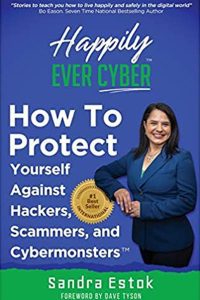
Happily Ever Cyber!: Protect Yourself Against Hackers, Scammers, And Cybermonsters By Sandra Estok
We are going to be talking about email in EXTRA. I’m excited about that and how to avoid the situation that you talked about where there is a transaction, the emails get intercepted and our money goes somewhere that it should not be going. I’m sure there are many other examples, but that’s a good one. Before we close the show, are you ready for our three rapid-fire questions?
Yes.
Tell us one super tip on getting started in real estate investing.
Be passionate. If you are going to invest either being a buyer or having a business, make sure that is your passion. When that happens, you will breathe, dream and live for that. There is no better feeling than being passionate about and doing what you love to do.
What is one strategy for being successful in real estate investing?
If you are a beginner, have someone that can guide you through your journey. In my case, I have so many mentors and people helping me through the process. Whether in real estate or business, I always seek someone that knows what he is doing. I’m buying and selling a house, so I will never do it without the help of experts because this is what they do and they can learn if that is my passion. If it’s not something I want to do, I want to do it right. Always seek someone with that expertise that can take you much faster to wherever you want to go.
Always find somebody that can get you faster to the place that you want to go. That is so good. I love that. That is a good soundbite. What is one daily practice you do that contributes to your success?
Gratitude. There is not a single day that I wake up and I am not grateful for another day. Grateful for another opportunity to play and serve. Even in the tough moments, when you are not happy, something didn’t go right, I use gratitude. It is amazing how fast I get off whatever negative emotion I have and how much clarity I get even if the situation was tough, how much I understand that it was for good that it happened that way. I am always grateful for everything.
Thank you so much for everything you have offered on this portion of the show. I can’t wait to talk more in EXTRA, but thank you so much.
Always find somebody that can get you faster to the place you want to go.
Thank you. My pleasure. Remember, practice mindfulness. Be present and that alone will help you so much to reduce the chances of being a victim of identity theft for cybercrime. It makes you enjoy much more of what you are doing, which is investing.
If you are subscribed to EXTRA, stay tuned. We are going to be talking about how to protect yourself in the email. This is that thing that we use all the time, every day for everything we are doing right. It makes us vulnerable in certain ways. We are going to be talking about how to reduce that vulnerability in your email in EXTRA. This is relevant for everybody. If you are not subscribed to EXTRA, go to RealEstateInvestingForWomenEXTRA.com and sign up. You get the first seven days for free.
Get this EXTRA and find out how to protect yourself. You could read to as many as you like in the first seven days. If you love it, then you stick with it. If not, you can unsubscribe, no big deal. For those of you that are leaving us, thank you so much for joining us. You know how much I appreciate you. I look forward to seeing you next time. Until then, remember, goals without action are just dreams. Get out there, take action and create the life your heart deeply desires.
Important Links
- Way2Protect
- Happily Ever Cyber
- Dashlane
- LastPass
- 1Pass
- HappilyEverCyber.com
- RealEstateInvestingForWomenEXTRA.com
About Sandra Estok
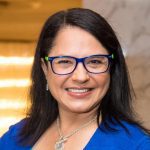 Sandra works with organizations to increase their cybersecurity programs’ efficacy by making the content relatable and personal. As a result, companies can increase engagement and awareness of their first line of defense again cyber threats: its people.
Sandra works with organizations to increase their cybersecurity programs’ efficacy by making the content relatable and personal. As a result, companies can increase engagement and awareness of their first line of defense again cyber threats: its people.
She utilizes her journey combined with her 20 plus years of experience in the Cybersecurity, IT, and Data Privacy industries to empower your teams to take charge of their cyber safety. Throughout her career, Sandra has held numerous positions in Fortune 500 companies in the United States, Latin America, and Europe in private and public organizations.
Sandra is the author of the international bestseller and award-winning book series Happily Ever Cyber!™ and the Cyber Literacy Series for children. In addition, she is a keynote speaker and corporate trainer. Her latest project, the Inner Cyber online course, combines a unique, purposeful, and long-lasting way to adopt a cyber safety-focused lifestyle.
Love the show? Subscribe, rate, review, and share!
______________________________________
To listen to the EXTRA portion of this show go to RealEstateInvestingForWomenExtra.com
To see this program in video:
Search on Roku for Real Estate Investing 4 Women or go to this link: https://blissfulinvestor.com/biroku
On YouTube go to Real Estate Investing for Women
Moneeka Sawyer is often described as one of the most blissful people you will ever meet. She has been investing in Real Estate for over 20 years, so has been through all the different cycles of the market. Still, she has turned $10,000 into over $5,000,000, working only 5-10 hours per MONTH with very little stress.
While building her multi-million dollar business, she has traveled to over 55 countries, dances every single day, supports causes that are important to her, and spends lots of time with her husband of over 20 years.
She is the international best-selling author of the multiple award-winning books “Choose Bliss: The Power and Practice of Joy and Contentment” and “Real Estate Investing for Women: Expert Conversations to Increase Wealth and Happiness the Blissful Way.”
Moneeka has been featured on stages including Carnegie Hall and Nasdaq, radio, podcasts such as Achieve Your Goals with Hal Elrod, and TV stations including ABC, CBS, FOX, and the CW, impacting over 150 million people.
How Bezos, Buffett, Musk, And YOU Can Pay $0 In Taxes Legally With Mark Willis – Real Estate For Women
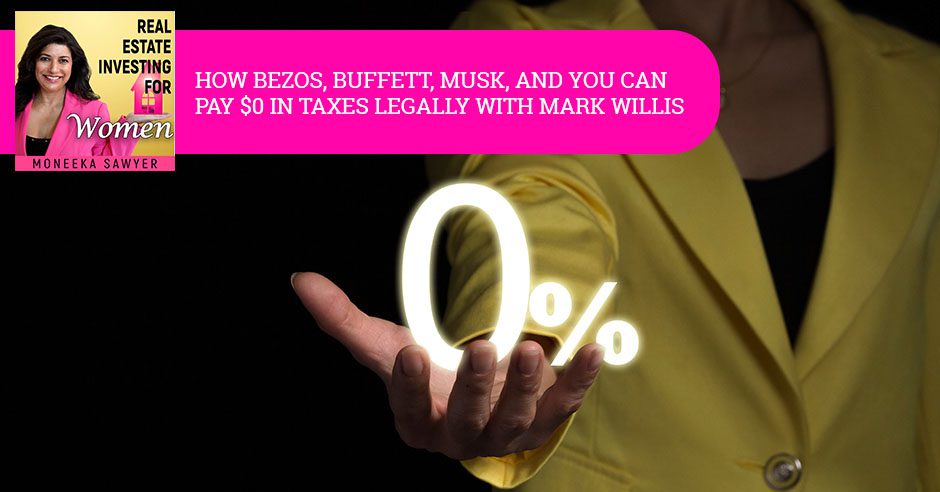
Taxes take a lot from you – your finances, your time, and your energy. What if you’re told you can legally pay zero in taxes today? Believe it or not, there are ways you can enjoy retirement freely without worrying about the IRS. Mark Willis is a man on a mission to help you think differently about your money, your economy, and your future. Mark is a certified financial planner, a three-time number one bestselling author, and the owner of Lake Growth Financial Services. Mark joins Moneeka Sawyer to talk about how you can grow wealth in ways that are safe so you can enjoy tax-free income in retirement. Listen in as Mark shares how you can become your own source of financing so you can have financial control over your future.
—
Watch the episode here
Listen to the podcast here
How Bezos, Buffett, Musk, And YOU Can Pay $0 In Taxes Legally With Mark Willis – Real Estate For Women
Real Estate Investing For Women
I am so excited to welcome back Mark Willis to the show. You’ve heard from Mark several times on this show. We’ve even had webinars with him. He’s shot me an email and said, “I’ve got this new strategy. It’s called BBD.” I’m not going to tell you what that is. I’m so excited to share this strategy with you and include you in this conversation.
Before we move forward with BBD, let me reintroduce Mark to those of you who have not met him yet. Mark Willis, CFP, is a man on a mission to help you think differently about your money, your economy and your future. Mark is a certified financial planner, a three-time number one bestselling author, and the Owner of Lake Growth Financial Services, a financial firm in Chicago, Illinois.
As cohost of the Not Your Average Financial Podcast™, which I’ve been on, he shares some of his strategies for investing in real estate, paying for college without going broke, and creating an income in a retirement that you will not outlive. He works with people who want to grow their wealth in ways that are safe and predictable, to become their own source of financing, and to create tax-free income in retirement. That’s all very exciting. It’s no wonder I always want to have Mark on the show. Mark, welcome back to the show.
Thanks for having me. I’m excited to see what we do here together. It’s always fun to see what sort of magic we can create together.
It always is magic. We were having a conversation before in the green room about this idea of the new year, and you had a question for me. Could you remind me what that was?
I had been tuning in to your show like all smart real estate investors should be tuning in to your show. In one of your episodes on the very first day of 2022, you brought up a theme or an inspiration toward this year that we’re living in. There was a theme of matching the masculine and the feminine together. Maybe you can speak more eloquently about this than I could.
The world has been so masculinely dominated that even women feel the need to do business as men.
2022 is year six. I studied Numerology many years ago. It’s a very Indian thing to study Numerology. It’s where it came from originally. The six stands for balance. Specifically, the balance between the masculine and the feminine. In year six, what happens is this energy of melding the masculine with the feminine comes into the energy space of the planet. What’s so fun about that is because our world has been so masculinely dominated, even as women, we feel we need to do business as men, this is a year where that balance happens both for the men or the women if we’re able to focus on it. It’s easier to bring that closer.
This is one of those years where we women can step forward in our power. I am not a feminist who says, “Up with women, down with men.” I have never ever been that person. For me, we both need each other. We all need the masculine and the feminine because they’re both parts of who we are. Women by default experience more of feminine characteristics than masculine, but as you said in the green room, we have both. The true bliss and massive success in life happen when you’re able to plug into the resources of both of those, and this is a year for us to do that. Does that make sense?
It sure does. There’s a little island in the Nordic countries where the men would go out and fish all day, every day. The women ran all the businesses in town. It was all women-owned businesses. Globalization happened and all the men were put out of work. The women run that whole town now. They run the whole island. They’re the mayors, the politicians, the bakers, the candlestick makers, all that. The point is we need each other. We need each other for these times when the unexpected happens like globalization or a pandemic to help us learn both masculine and feminine in our lives and in our work.
They bring different resources. We bring different skills and different talents, so it’s a big advantage if you can plug into both, and this is the year to do that. Women, step forward in your power. Claim the feminine along with your masculine. Thank you so much for asking that question. Let’s get back to you. First of all, tell us what BBD stands for because it makes me laugh, and then let’s talk all about why are you bringing this forward to your clients and out into the world?
Tax-Free Wealth
I’ll only tell you and the audience what it stands for if your audience promises not to unsubscribe as soon as I say what it stands for because it’s a little off-putting. The BBD stands for Buy, Borrow, Die. You’ve got to listen a little more to get some context here. Let me ask you, what if you could build massive amounts of wealth and never pay taxes? We’re going to guide you through these three steps to invest completely tax-free even when you’re taking cash out of your investment and you’ve got cashflow to fund your lifestyle here and now, but also in the future in retirement. If we think taxes are even going to be the same or even certainly higher than they are now, this is going to be a very important show for anyone wanting to build wealth.
Let’s dig in. Mark and I are friends now. We’ve been working with each other for a long time. We spent all this time in the green room, and then he suddenly told me, “I got to be gone at this time.” I was like, “We got to go fast.” I’m going to let you jump in there and I’ll ask questions as I go along the way, but why don’t you take it away so that my ladies get all the information that they deserve on this one?

Zero Taxes: All of these incentives are like dancing with your partner, the IRS. You want to avoid stepping on their toes, but not run away from the dance party.
Thank you. You’ve done such a great job with your show. I will get right to things here. ProPublica, which is an investigative newsroom, obtained a vast trove of IRS tax data on the wealthiest Americans. It covered more than fifteen years. This data dump, leak or whatever you want to call it, provides an interesting look into the true nature of America’s titans like Warren Buffett, Bill Gates, Rupert Murdoch, Mark Zuckerberg, and Elon Musk to name a few. It provides an interesting look at not just their income number, which is astounding, but also how they avoid legally any taxes on their investments, stock, trades or gambling winnings.
In 2007, Jeff Bezos didn’t pay a penny in Federal income tax. He did it again in 2011. In 2018, Elon Musk also paid no income taxes. Michael Bloomberg did it in the last few years as well. These are legal and perfectly legitimate ways to avoid paying taxes, not evading, that’s a clear distinction there. There are ways to do it that are well-known and established fundamental parts of the IRC or the Internal Revenue Code. As I say this, my guess is your audience has 1 of 2 responses. They might either say, “How could they do that?” out of anger. They might also say, “How can I do that?” out of curiosity. I hope it’s the latter. There are reasons to have both sides of that conversation.
This is not a political episode, I promise. The goal will be to teach your readers a little bit about how this happens. Most Americans pay income taxes on their paychecks. Most Americans do live paycheck to paycheck, so we’re paying the highest tax rates on the vast majority of our earned income. In fact, the 25 wealthiest Americans only paid 3.4% of their income tax whereas the average American or the median household paid 14%, and the highest bracket is 37% tax. That’s something interesting that the wealthiest are paying 1/10 as much as us mere mortals with earned incomes. What are your thoughts so far?
I do have a quick question. Thank you for that. Clarify avoid versus evade. That’s very important.
The Internal Revenue Code was established in 1913, which is an interesting year because it’s the same year the Federal Reserve was created. Before we had the Internal Revenue Code of 1913, there was no income tax at all. Starting in 1913, it was there to pay for covering the cost of World War I and beyond. It was there to establish itself permanently after World War II. In the 1950s and 1960s, it became a series of incentives for us to follow. It’s sort of a psychological experiment, but in many ways when you think about it, why does the government tax you at all? It can print its own money. Let that sink in for a minute. Why does it need our tax money if it can print endless amounts? That’s interesting.
We can’t pay our taxes in Bitcoin or rubber chickens. We have to use US dollars. That’s the one thing there’s an infinite supply of at and at the US government, so why do they tax us? Part of it is to get us to do certain things like buy a house, have children, start a business or invest in real estate. All of these incentives are dancing with your partner, which is the IRS. If we can avoid stepping on the IRS’ toes in this dance and not evade, because we’re not running from the dance. That’s where you end up in jail. You got to dance with this dance partner. As the old saying goes, “You got to dance with the devil who came with you.” We want to avoid stepping on their toes but not run away from the dance party.
Massive success happens when you’re able to plug into the resources of both masculinity and femininity.
I love the analogy of the dance. Thank you for that.
Buy
Guys and gals, get out a sheet of paper and write down three words for me. The words are Buy, Borrow, and Die. Each of these steps represents a key feature to the IRS Tax Code in the American Tax Law, and where you can live totally income tax-free if you do it right. Let’s talk about each one. The first is buy. You’re supposed to buy assets. Buy an asset that goes up in value. Let’s say you buy a piece of real estate or stock, but it has to be an asset that does not produce cash. It cannot produce cashflow, which is an anathema to us real estate investors. If you’re going to buy an asset that produces cashflow, that’s going to generate an income. That income is taxable.
The buy step works because we’re realizing appreciation but we’re not experiencing an income flow. This would not be your typical mutual fund or a dividend-paying stock. Warren Buffett’s stock, Berkshire Hathaway, hasn’t paid a dividend since 1965. How is that possible? They’re very profitable as a company, but they haven’t paid dividends. Why? It’s so that Warren and his team do not have to realize any income on their income taxes. There are a lot of examples of how much he would have had to pay in terms of his taxes. Multiple billions of dollars of taxes would have been paid if Berkshire Hathaway had paid a dividend. The first step is to buy assets that go up in value that do not generate an income.
Borrow
The second step is to borrow against that appreciating asset. You’re supposed to buy and then borrow against it. Strangely enough in the IRC, loans are not considered income. Any kind of loan you receive whether it’s a credit card, mortgage or business loan is not considered income when you simply borrow money. That’s true whether it’s a credit card or borrowing against highly appreciated stock like Elon Musk does. In fact, he was jostled by Elizabeth Warren because he was not paying his fair share. I’m going to stay away from that conversation and tweet-storms that Elizabeth Warren and Elon Musk might have had. Her basic complaint was he was taking all this income but he’s saying, “I didn’t take income. I simply borrowed against my Tesla shares.”
He said if Tesla was to go down in value, he would immediately and instantly go bankrupt, which is an interesting statement to say from the richest person in the world. Borrowing against your appreciating asset allows you to live with no taxes due. That’s how you’re able to buy your groceries, gas, or in Elon’s case, your tenth yacht, and gives you a chance to live on that without experiencing any income tax. Do you have any thoughts on number one or number two so far?
One of the things that I want to emphasize is we can all borrow on our stock. It’s available to all of us. We can also invest our portfolios on margin with this 50% leverage, which is also borrowing on the value of the stock. You can do those things. However, the stock market is extremely volatile. When you do those things, when you borrow on your stock or go on margin, you have the situation which Elon talked about, which is if the stock goes down, there’s a call on that loan or margin.

Zero Taxes: If you’re going to buy an asset that produces cash flow, that’s going to generate an income and that income is taxable. So, you’ll want to buy an asset that does not produce cash because then you’re realizing appreciation, but not experiencing an income flow.
This is what happened. I believe it was 2001. Many people had so much stock that they had gone from the boom. They had all these options, and now those options had exercised them, but their value was down, so the brokerage firms called them on it because they were out of money. All these people had to sell their homes, go into foreclosure or file bankruptcy. That’s what happened in that part of the financial crisis back then.
When you’re looking at stocks, you have this volatility that you have to deal with. That’s why I love real estate, because first of all, your leverage is you’re putting 1/5. You got five times the leverage rather than double, and you cannot get called on. Banks do not want to own real estate. If the market plummets as it did in 2007, 2008 and 2009, the banks are not going to call out those loans.
That’s a situation where if you can manage to continue to pay your mortgage, you’re in a good market, and the market is going to rise so that your property values will recover, it’s a situation where you can stay in. You never get called and you never go bankrupt or lose your shirt because you’ve taken a loan on a hard asset, and then that hard asset stays a hard asset. They’re not going to call your loan on it unless you stop paying. That’s a big difference in what kinds of loans you’re taking. There are many other kinds of loans. Those are just two examples that Mark gave. I wanted to highlight the differences there and why I love real estate for this sort of thing.
That’s so true. Not to point out political figures, but Donald Trump is a great example of doing exactly this. Regardless of his politics, that’s one wealthy guy or he claims to be anyway. He used it off the back of the real estate and borrows against it for his lifestyle, needs and otherwise. It’s not like he’s flipping burgers at McDonald’s to make his income. You’re exactly right.
The other piece to that puzzle is no income tax is due when you borrow that money. Let’s say you earned $1 at your day job flipping burgers. You might end up with $0.70 when you walk home due to the taxes due on that $1 that you earned. When you borrow $1, you get 100 cents, and you can use that for additional investing, buying your groceries, your yachts or whatever you might want to do with your money. There’s an efficiency standard there when you say borrowing against an asset versus earning income to do it.
You bring up a great point that there is an inherent risk. Even the wealthy understand this. They understand that they could possibly go belly up. If you think about Mark Zuckerberg who had to buy into the strategy. He had to pay billions of dollars in 2013. He paid between $1 billion and $2 billion of taxes in that year alone to buy his ticket. To get on this Buy, Borrow, Die train, you have to buy your ticket. That’s another key element to this BBD strategy. You got to make sure you’re getting on the train. Once you’re on the train and you’ve paid your dues to society with these massive tax bills, you now have this highly appreciating asset that’s growing in value.
Women, step forward, gain your power, and claim your femininity along with your masculinity.
Whatever happens to Facebook stock, Meta stock or whatever they want us to call it now, it will continue to go up and down and he’s got that risk where it might plummet. There’s nothing guaranteed about Facebook or Metaverse stock. In the meantime, borrowing against that asset is a tax-free way to do it. I truly think that even if he was to pass away, which I don’t want to give away the farm here for letter D, he can give that highly appreciated asset to his children, and then the gain continues. The grandma or grandpa does this, and the kids and grandkids get to stay on that train as long as they’re able to keep that wealth and not sell those stocks.
Die
There are a couple of things that come up for me on this. The first thing is I have never recommended borrowing to live your lifestyle. I’d love to address that if we got the time. The other thing is you might be thinking it’s appreciating. Eventually, you have to pay capital gains on that. That’s where the die piece comes in. The tax laws now are very favorable where your basis goes up to when that person died, so your taxes get completely eliminated from that appreciation. We’ll get into that a little bit more in EXTRA because we want to talk about the die piece. We’re not going to die. We’re not going to talk about the morbid subject of dying, but to give you clarity more on how this whole thing can work. Can you address the whole thing about borrowing for lifestyle stuff?
Yes. I’m playing a little bit of devil’s advocate here because I don’t recommend that your Average Jane or Average Joe does exactly what we’re talking about on borrowing against your stock account or borrowing heavily for consumer purchases, for example. I agree with you, Moneeka. In fact, I specifically specialize in an asset class that has no risk for loss. It builds and grows on a guaranteed basis every single day, every single year. The asset of whole life insurance grows on a guaranteed basis every single year, and there’s nothing that we can do to stop it in times of good, in times of bad, the market crashes, the market is booming.
A whole life insurance policy of all things in the financial universe grows on a guaranteed basis. Interestingly enough, the cash value does not automatically spin-off income, so it meets the criteria of not churning out an income. You can borrow against the life insurance cash value. When you borrow against the life insurance cash value, it continues to grow. The life insurance cash value will continuously compound and grow uninterrupted like a house but guaranteed.
If I’ve got a house worth $500,000 and I use a HELOC on my house to go invest in another real estate deal, people sometimes do that. I’m not saying it’s a good idea or not. For all people, it’s certainly not, but sometimes it works. Now your money is doing two things at once there. Your house is still growing as if there was no HELOC. Zillow doesn’t care if we have a HELOC or not, but we also use the HELOC money to go buy this other real estate deal. What could possibly go wrong? See reference 2008.
As long as you can hold it, you’re okay.

Zero Taxes: It’s not considered income when you simply borrow money. Borrowing against your appreciating asset allows you to live with no taxes due.
That’s right. As long as you can hold it and pay those HELOC fees and everything, you’re okay. The risk of going underwater with a whole life policy is zero. There’s no way to go underwater with a life insurance policy because it continuously compounds. You can lapse a policy but the worst that could happen there is you just get to keep the house purchase that you made and the life insurance goes away. You have to watch that, but it’s guaranteed to grow for you on every day or every year basis. It can be used in the Buy, Borrow, Die way. We’ve got clients that are putting a couple of hundred bucks a month into one of those whole life policies. You don’t need to be a billionaire to do this strategy. Maybe there’s a thought there that you have or feedback on that.
I love that you brought that back in. For me, there’s a resistance to thinking about borrowing for lifestyle. Maybe that’s a different conversation that we have. Ladies, so you understand that that’s something very definitively to think about, for me, the paradigm shift that’s happening at this moment is I have a resistance to that because I’ve built my financial world based on we don’t borrow to live, but it sounds like the rich really do.
The goal of the use of that policy especially as you’re working and in your younger years is to simply use it for increasing your assets, leveraging your assets, and using it to buy cashflow producing assets like real estate and whatnot. This is a key difference between a credit card and a regular loan. When you borrow against a life insurance policy in retirement, let’s say I’m 75 years old and I want to live on $150,000 this year, for example, I can borrow against my life insurance policy, pay no taxes on that, and it’s a non-recourse loan. If I was to borrow against life insurance, I don’t have to pay it back. There’s no requirement by the insurance company for me to pay it back during my lifetime.
If I take that loan to my grave, my death benefit is simply reduced by whatever I borrowed against the policy. Let’s say I’ve got a $5 million death benefit and I borrow $10 million over ten years. That’s $1 million a year tax-free, then I pass away and die. I’d still leave my family $4 million income-tax-free even though I had borrowed against those policies for the policy cash value for all those years. There are no taxes due on that money when I simply pass away. I could use that to invest in real estate, but I could as easily use it for the grandkids, groceries or whatever I might need. I wouldn’t recommend that when I’m 35 or 45 though.
It’s a $5 million cash benefit and you take $1 million for ten years, so that’s $10 million.
I did my math too quickly there. There’s a $5 million death benefit. Let’s say I took $1 million over ten years, so that’s $100,000 a year, and you spend that money over the ten-year period and you pass away. $5 million minus $1 million is $4 million tax-free.
Find assets that grow on a predictable schedule.
We’ve got buy and borrow, which we covered in the first part of the show, and I want to make sure that we can get to EXTRA. We’re out of time a little bit, but is there anything you want to add regarding Buy and Borrow? I’ve got a couple of things that I want to share with the audience about you and then we’ll move to EXTRA.
The best thing we can say here is to find assets that grow on a predictable schedule. Real estate and whole life insurance have more wealth created. The fundamental underlying idea between real estate and whole life insurance is they are both contracts. If you think about it, the real power of the real estate deal is the contract. The real power of whole life insurance is the contract, and that’s where real wealth is built. It’s not paper wealth like Wall Street. From a philosophical standpoint, that’s where I particularly love to build real wealth. It’s on the contract and not just on paper up and down on Wall Street.
Mark is this huge resource of information. He loves chatting with you, ladies. I know many of you have already called him. For those of you that have not and would like to get in touch with him, go to BlissfulInvestor.com/mark. You can go do that. That’s his personal calendar so you can get on the schedule to chat with him.
I am so excited about this whole concept. We touched the tip of the iceberg here. There’s so much information. I don’t even feel complete with this conversation. Mark warned me that it’s a big topic. We’ve decided that in order to go deeper and answer the questions and understand this, we’re going to be doing a webinar. That webinar is going to be on February 3rd, 2022 from 1:00 PM to 2:30 PM Pacific time. To sign up for that, go to BlissfulInvestor.com/markwebinar. We will be talking much more in-depth about the BBD strategy. Is there anything you wanted to add after that before we go into your three Rapid-fire questions?
Everybody, give Moneeka a super awesome high-five in your heart and give her a five-star review because it really makes a difference. Thank you, Moneeka.
Thank you so much. Tell us one super tip on getting started investing in real estate.

Zero Taxes: The fundamental, underlying idea between real estate and whole life insurance is they are both contracts. If you think about it, the real power of the real estate deal is the contract and the real power of whole life insurance is the contract, and that’s where real wealth is built.
It’s about scaling up. Here’s a simple thing to do. Find your bank account balance, print it out, and then draw two zeros at the end to see how it feels.
Give us a strategy for being successful in real estate investing.
Pick one area and make it your niche. Don’t listen to 10,000 gurus. Make it one person that you know is doing it for real and chase after it with all your heart.
What is one daily practice you do that contributes to your personal success?
Starting with an affirmation that says something against what the world would want you to believe about yourself or the world itself. It’s something that is true and good and focuses on the positive.
Ladies, thank you so much for joining Mark and me for this portion of this show. We’ve got more in EXTRA. We’re going to be talking about the D portion of BBD. It’s a little bit morbid but it’s such an interesting conversation because you need to know what happens as you move forward building all this wealth. We’re going to be talking about the die portion in EXTRA. Stay tuned if you’re subscribed. If not, go to RealEstateInvestingForWomenExtra.com and you can sign up there.
Remember, we’ve got a webinar. Go to BlissfulInvestor.com/markwebinar. Sign up for that. If you want to talk to mark specifically about your own strategy, go to BlissfulInvestor.com/mark. Thank you again for joining us. I will look forward to seeing you next time. Until then, remember that goals without action are just dreams, so get out there, take action, and create the life your heart deeply desires. I’ll see you soon. Bye.
Important Links
- Lake Growth Financial Services
- Not Your Average Financial Podcast™
- BlissfulInvestor.com/mark
- BlissfulInvestor.com/markwebinar
- RealEstateInvestingForWomenExtra.com
About Mark Willis

Mark Willis, CFP® is a man on a mission to help you think differently about your money, your economy and your future. After graduating with six figures of student loan debt and discovering a way to turn his debt into real wealth as he watched everybody lose their retirement savings and home equity in 2008, he knew that he needed to find a more predictable way to meet his financial objectives and those of his clients.
Mark is a CERTIFIED FINANCIAL PLANNER™, a three-time #1 Best Selling Author and the owner of Lake Growth Financial Services, a financial firm in Chicago, Illinois. Over the years, he has helped hundreds of his clients take back control of their financial future and build their businesses with proven, tax-efficient financial solutions. He specializes in building custom-tailored financial strategies that are unknown to typical stock-jockeys, attorneys, or other financial gurus. As host of the Not Your Average Financial Podcast™, he shares some of his strategies for working with real estate, paying for college without going broke, and creating an income in retirement you will not outlive. Mark works with people who want to grow their wealth in ways that are safe and predictable, to become their own source of financing, and create tax-free income in retirement.
Love the show? Subscribe, rate, review, and share!
______________________________________
To listen to the EXTRA portion of this show go to RealEstateInvestingForWomenExtra.com
To see this program in video:
Search on Roku for Real Estate Investing 4 Women or go to this link: https://blissfulinvestor.com/biroku
On YouTube go to Real Estate Investing for Women
Moneeka Sawyer is often described as one of the most blissful people you will ever meet. She has been investing in Real Estate for over 20 years, so has been through all the different cycles of the market. Still, she has turned $10,000 into over $5,000,000, working only 5-10 hours per MONTH with very little stress.
While building her multi-million dollar business, she has traveled to over 55 countries, dances every single day, supports causes that are important to her, and spends lots of time with her husband of over 20 years.
She is the international best-selling author of the multiple award-winning books “Choose Bliss: The Power and Practice of Joy and Contentment” and “Real Estate Investing for Women: Expert Conversations to Increase Wealth and Happiness the Blissful Way.”
Moneeka has been featured on stages including Carnegie Hall and Nasdaq, radio, podcasts such as Achieve Your Goals with Hal Elrod, and TV stations including ABC, CBS, FOX, and the CW, impacting over 150 million people.

